
Puppy’s First Vet Visit: What to Expect, Checklist and Tips
By: Dr. Jennifer Coates, DVM Updated: September 12, 2023
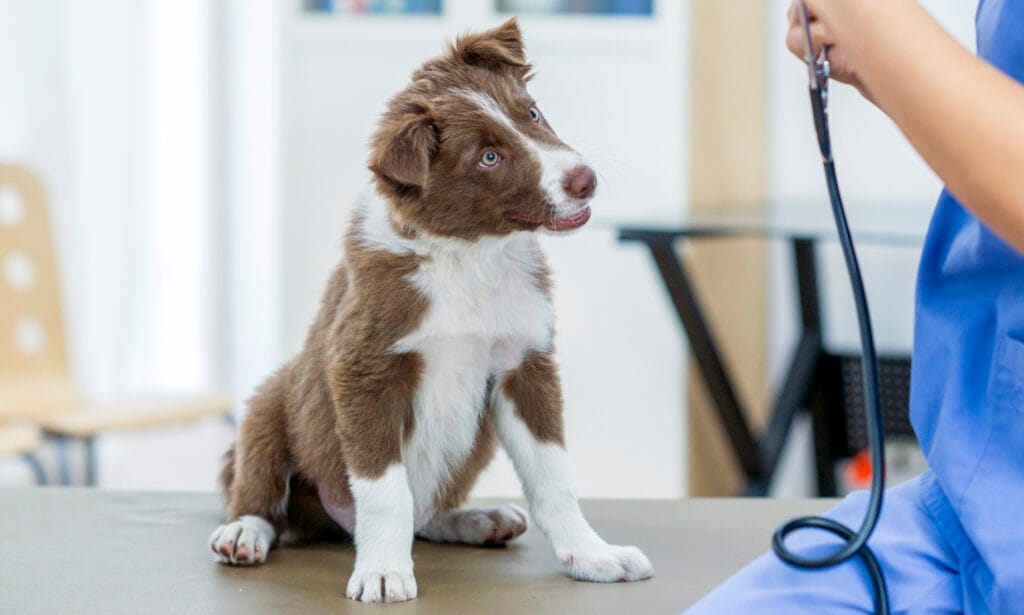
Home / New Pet / New Dog / Puppy’s First Vet Visit: What to Expect, Checklist and Tips

S o cute! So sweet! So… sick?
Puppies may act like they’re up for anything, but because of their immature immune systems, they’re quite susceptible to illness and injury. It’s absolutely vital that you schedule your puppy’s first vet visit within the first few days of bringing them home. Healthy puppies need to start on their preventative care so that they can stay healthy, and sick puppies need treatment before their condition becomes serious or even life-threatening.
If you’re the proud pet parent of a new puppy, here is what you should know about taking your puppy to their first vet visit.
When to Take a Puppy to the Vet for the First Time
Many dog shelters and breeders start vet visits for puppies before they release their little ones to new pet parents. You should receive paperwork that clearly states what type of care has already been provided, when that occurred, and when you should schedule your puppy’s next veterinary visit.
But regardless of what the shelter or breeder has already done, it is always a good idea to schedule a new puppy vet visit within a few days of picking up your new canine companion. This will allow the veterinarian to review your pup’s records and quickly provide any overdue care. The doctor will also perform a complete physical examination and perhaps run some laboratory tests to identify any potential health concerns. It’s best to learn about problems as soon as possible before any health guarantees the breeder provides expires.
A typical vet schedule for puppies is for appointments to occur every 3 to 4 weeks starting when puppies are 6 to 8 weeks old and ending when they are 4 or 5 months old. Most puppies start their vaccinations when they are 6 to 8 weeks old. Puppies who receive their first vaccinations when they are older than 4 or 5 months of age can usually be caught up in two visits scheduled 3 to 4 weeks apart. Your veterinarian may adjust this plan based on your puppy’s particular history and needs.
Get a complete guide to dog vaccines .

How to Prepare for Your Puppy’s First Vet Visit
Collect as much information as possible in the days before your puppy’s first vet visit. Has your puppy traveled from a different part of the country or world? Are you starting to notice behavioral problems as your pup settles in? Does your puppy have a good appetite with no vomiting or diarrhea? Is potty training proceeding as you expected?
While it is, of course, fine to answer a vet’s question with “I don’t know” (you can always call back with the answer), the more information you can provide during the appointment the better.
What to Bring to the Veterinarian Appointment
Collect everything you’ll need to bring with you for your puppy’s first vet visit.
Puppy’s First Vet Visit Checklist
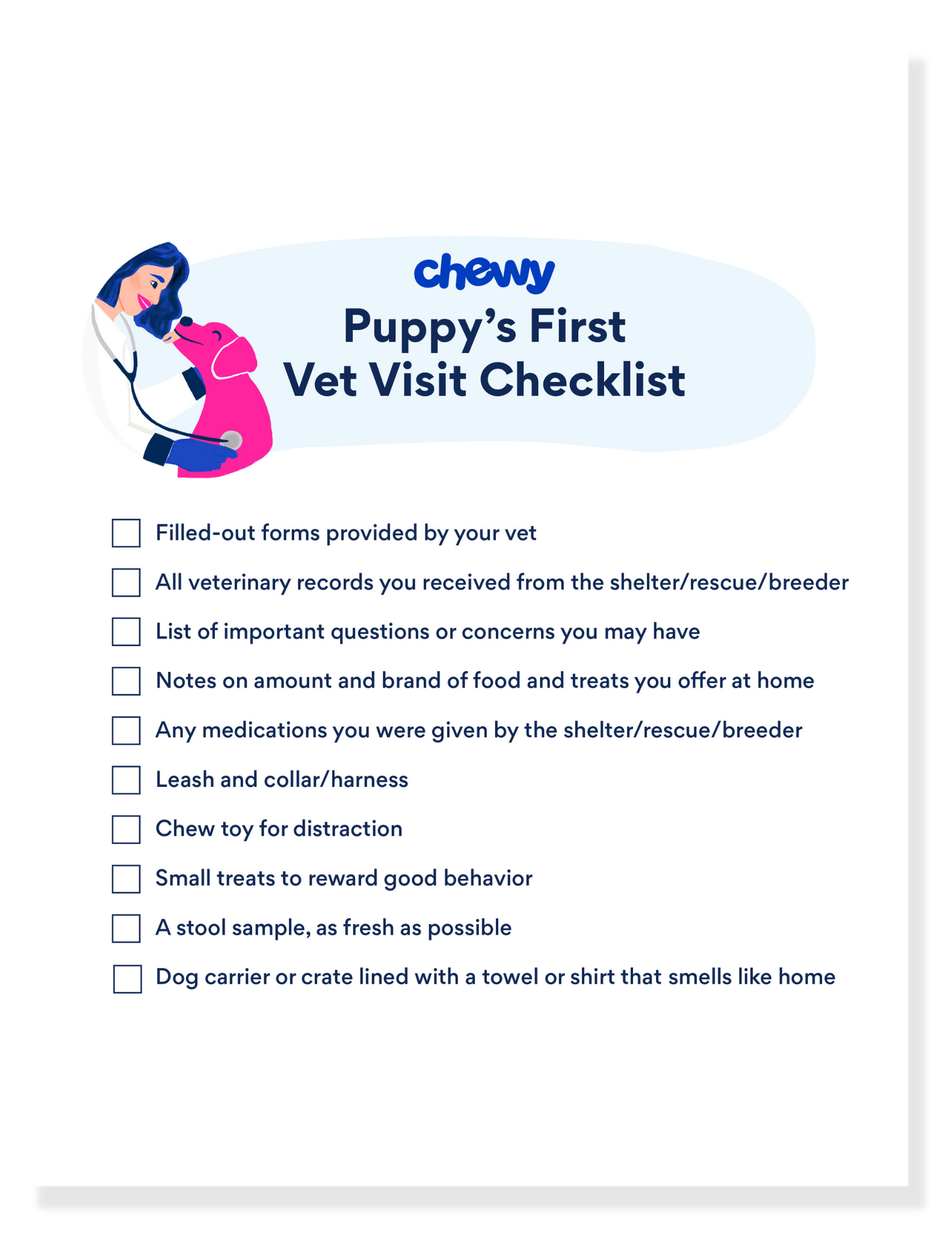
- Any veterinary records you received from the breeder or shelter
- Written list of important questions or concerns that you might have
- Notes on how much of what types of foods and treats you offer at home
- Dog carrier or crate lined with some old towels or shirts that smell like home
- Leash and collar or harness
- Chew toy for distraction
- Small treats to reward good behavior
- Any forms provided by your veterinarian that you have already filled out
- A stool sample, as fresh as possible
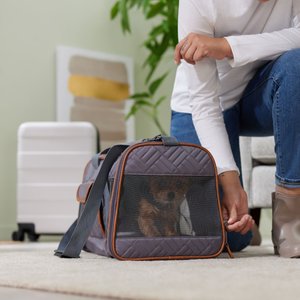
What to Expect During Your Puppy’s First Vet Visit
Veterinary staff will start the visit by asking you a series of questions about your puppy’s history and how they are doing at home, followed by:
- A weight check
- Measuring body temperature and pulse and respiratory rates
- A complete physical examination, which includes
- Observing the puppy move around the exam room
- Looking at the whole body including the eyes, ears, nose, feet, nails, skin, coat and genitalia
- Opening the mouth to observe the teeth, gums and other structures
- Checking the eyes and ears with instruments that provide light and magnification
- Palpating (using hands to feel) the lymph nodes, joints and organs within the abdomen
- Using a stethoscope to listen to the heart and lungs
- Checking reflexes
If you didn’t bring a stool sample with you from home, your veterinarian may need to collect one to check for intestinal parasites. If your puppy is 6 months old or older, the doctor or veterinary technician may also draw a small sample of blood for heartworm testing. Other lab work is run on an as-needed basis.
Throughout all the new puppy vet visits, the veterinary staff will discuss many important aspects of dog care with you including:
- Exercise and play requirements
- Behavior and socialization
- Pet identification, including microchips and tags
- Reproductive health, including the benefits and risks of spaying and neutering
- Dental care
- Grooming needs
- Travel requirements
- Pet safety and disaster preparedness
- Flea, tick, heartworm and internal parasite control
- Vaccination schedules
- Diseases that can be spread from pets to people (and vice versa)
Download our Puppy Vaccinations Tracker printable .
Questions to Ask the Veterinarian
Your veterinarian should provide you with all the information that you need to help your puppy thrive, but look over the topics listed above. If your veterinarian forgot to address something or the information they provided was confusing, don’t hesitate to ask for clarification.
Cost of a Puppy’s Vet Visit
Most of what happens during a puppy’s first vet visit is quite routine and therefore not very expensive. Veterinary costs vary based on where you live, but be prepared for something in the range of $75 to $100 per puppy visit. Call your veterinarian for a more precise estimate so there are no unpleasant surprises. Veterinary wellness plans, vaccine clinics and pet insurance can all help you keep your costs down or spread them out over time.
While vet costs for puppies may seem high, it’s money well-spent preventing potentially serious and expensive health problems from developing later. After all, to be happy, a dog must be healthy.
More about caring for your puppy:
- Puppy Feeding Guide: How Much to Feed a Puppy and More
- Puppy Stages: What to Expect From Your Pup in the First Two Years
- Why Is My Puppy Whining? And How Can I Comfort Them?
Featured Products
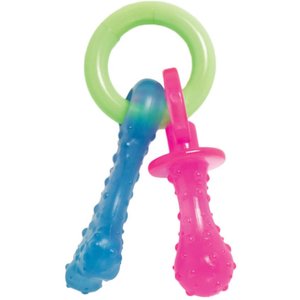
Related Posts
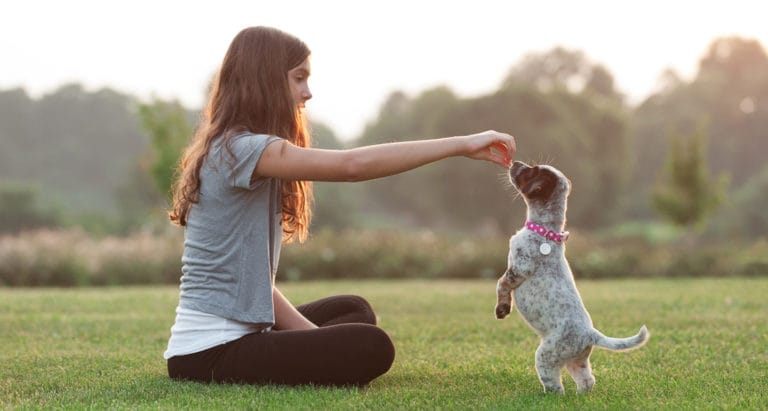
Puppy Training 101: Your Guide to Mastering Basic Puppy Training
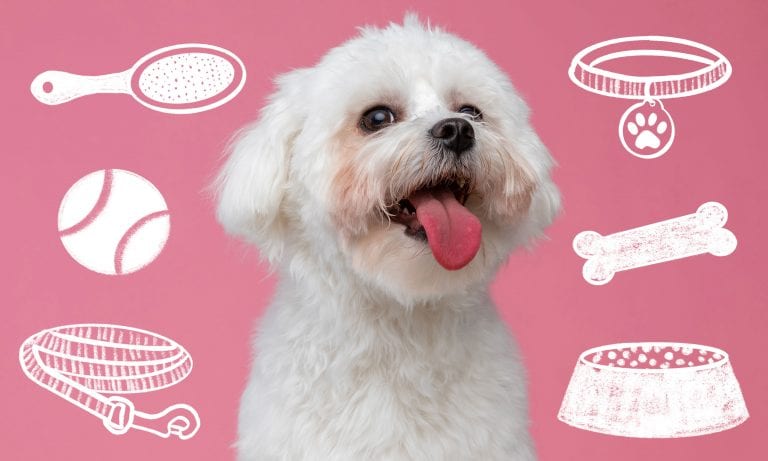
New Puppy Checklist: 9 Things You Need Before Bringing Home a New Puppy
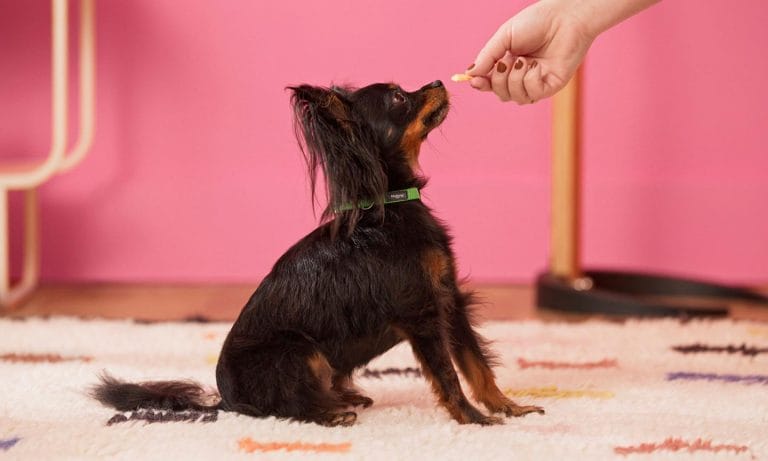
Your Essential Guide to Basic Dog Obedience Training
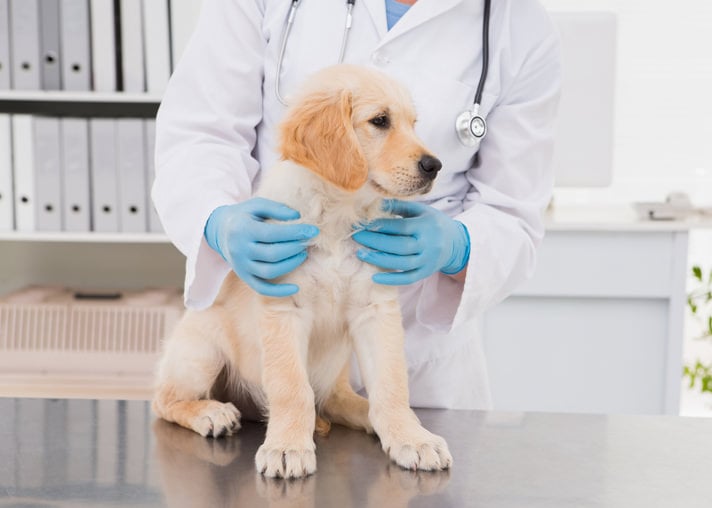
15 Questions Veterinarians Wish You Would Ask About Your Puppy

Bringing a Puppy Home? Here’s Everything You Need to Know

How to Stop Your Puppy from Barking: 5 Tips to Try
- Health & Nutrition
- View all in be well
- Style & Decor
- View all in be home
- Get Answers
- View all in be smart
- People X Pets
- View all in be inspired
- Chewy Gives Back
- Shelters / Rescues
- View all in be generous
Most Popular

By: BeChewy Editors Updated: October 10, 2023
Learn what to feed a puppy at every stage in their development with this veterinarian-approved puppy feeding guide for new puppy parents.
More Details

By: Linda Rodgers Updated: October 13, 2023
Some plants can give your pup diarrhea, others are extremely poisonous and can cause serious problems.

By: Irith Bloom, CPDT-KSA Updated: October 10, 2023
Want to know how you can potty train your dog in 7 days? Follow along on one family’s potty training journey and learn how you can housetrain your dog, too.
Our Services
- Chat with a Vet Online
Sick Pet Care and Diagnostics
- Allergies and Dermatology
- Pet Pain Management
- Orthopedic Examination
- Neurological Examination
- Electrocardiogram (ECG)
- Pet Ultrasound
- Veterinary Diagnostic Imaging
Wellness and Preventative Care
- Wellness Exam
- Puppy and Kitten Wellness
- Nutritional Consultation
- Behavioral Consultation
- Vaccination
- Microchipping
Travel Certificates
- Domestic Travel Certificate
- International Travel Certificate
Surgical Procedures
End-of-life care.
- In-Home Pet Euthanasia
- Quality-of-Life Consultation
Our Locations
- Philadelphia
- Washington, D.C. Area
- Conejo Valley
- Greater Los Angeles
- Orange County
- San Francisco
- How It Works?
- Our Veterinarians
- Referral Program
Pet Health Care Resources
- Pet Health Care
- Pet Nutrition
- Pet Symptoms
- Pet Conditions
- Pet Diseases
- Pet Medications
- Pet Lifestyle
Tools, Calculators & Calendars
- Pet Wellness Tools
- Pet Holidays and Awareness Days
Customer Support
- Help Center
- Code of Conduct

Puppy First Vet Visit: What You Can Expect

Table of Contents
Welcoming a new puppy is an exciting adventure, and we know keeping them healthy and happy is your main focus. Scheduling their very first vet visit is a top priority and being prepared for this appointment will give you peace of mind and lay the groundwork for their future well-being.
In this blog post, we'll walk you through what to expect during your puppy's first vet visit, giving you all the information you need to take great care of them from day one.
Key Takeaways:
- The first vet visit for your puppy is crucial for their overall health and well-being, including vaccinations, preventive treatments, and a comprehensive physical examination.
- Establishing a positive bond with the veterinarian during the first visit helps reduce stress for future visits and builds trust.
- It's crucial to schedule the visit early and be aware of signs that indicate a vet visit is needed.
Importance of Your Puppy's First Vet Visit
Early veterinary care for puppies is very important . Regular puppy checkups are essential for monitoring their growth, early detection of any potential health issues, and ensuring they receive necessary vaccinations and preventative treatments. By establishing a routine of regular vet visits, you can significantly contribute to your puppy's long-term health.
Moreover, the first vet visit is crucial in building a positive bond between your puppy and the veterinarian. It helps establish trust and familiarity, whether in the vet's office or the comfort of their home during a mobile vet visit , making future visits less stressful.
Stress-Free Wellness Exams for Your Growing Fur Baby
With our in-home visits, your kitten or puppy can snooze away while we keep their vaccines up-to-date and ensure they're on the right paw to a healthy and happy life.
What Happens During the Puppy Wellness Visit
During your puppy's first vet visit, several important procedures and examinations will typically take place. Here's what you can expect:
Comprehensive Physical Examination
The veterinarian will begin with a comprehensive physical examination to assess your puppy's overall health. This includes evaluating body condition, listening to their heart and lungs, examining their eyes, ears, and teeth, and feeling their abdomen for any abnormalities.
Vaccinations and preventive treatments
Puppy vaccinations and preventive treatments are other essential aspects of the visit. The vet will administer vaccinations to protect your puppy against common infectious diseases. They may also discuss and provide preventive treatments for parasites such as fleas, ticks, and heartworms . Deworming medications may be prescribed to eliminate intestinal parasites.
Health assessment and development tracking
Your vet will also conduct a thorough health assessment and track your puppy’s development. This includes monitoring weight, assessing growth milestones , and discussing behavior and trainin g , diet, or overall well-being concerns. They will provide valuable nutritional guidance and recommend a suitable diet to support your puppy's growth and specific needs.
How Big Will My Puppy Get?
Your puppy’s current age (in weeks), your puppy’s current weight (in pounds), view results, your puppy’s estimated weight in adulthood is pound/s, dental care.
Dental care is another essential component of the visit. The vet will offer advice on dental hygiene, including tooth brushing techniques and recommendations for dental treats or toys. Performing a dental examination to check for any signs of dental issues or abnormalities.
Microchipping and spaying/neutering
Additionally, the vet will discuss microchipping and spaying or neutering , providing guidance for your puppy's long-term health.
Addressing concerns and questions
Your puppy's first vet visit is an excellent opportunity to address any specific concerns or questions you may have as a new pet parent. The veterinarian will advise on training , socialization , behavior, or any other issues you wish to discuss.
Cost Considerations
The potential costs associated with the visit can vary based on geographical location and the specific services provided. It's a good idea to inquire about the fees associated with the visit beforehand, including the cost of the comprehensive physical examination, vaccinations, deworming, and any additional services or tests that may be recommended for your puppy's specific needs.
Some veterinary practices may offer pet wellness plans , which can help manage the costs of routine veterinary care by spreading them out over monthly payments. These plans often include services such as vaccinations, preventive treatments, and regular checkups. It may be worth discussing the availability and benefits of such plans with the veterinary practice.
When to Take a Puppy to the Vet
It's important to schedule your puppy's first vet visit within a few weeks of bringing them home, ideally around 6 to 8 weeks old . This early visit allows the vet to check their health and address any potential issues promptly.
Keep an eye out for signs that indicate it's time for a vet visit , such as persistent vomiting and diarrhea , loss of appetite , eye discharge , irregular urination, or changes in behavior. Trust your instincts and seek professional guidance when needed.
Related reading: How Often Should I Take My Dog to the Vet?
How to Prepare for Your Puppy Checkup
Preparing for your puppy's first vet visit is crucial to ensure a smooth experience. Here are some steps to help you get ready:
1. Gather important documents
Organize and compile any adoption or breeder paperwork, vaccination records, and medical history to provide the veterinarian with a comprehensive understanding of your puppy's background.
2. Note your questions and concerns
List any questions or concerns about your puppy's health, behavior, diet, or general care. This way, you won't forget to address anything during the appointment and can receive the necessary guidance.
3. Familiarize your puppy with car travel
To ensure your puppy's comfort, gradually introduce them to car travel . If needed, bring essential supplies like a leash, treats, and a carrier or crate. These items will help keep your puppy secure and comfortable during the visit.
What to Bring to the Appointment
To ensure a successful and organized first vet visit for your puppy, it's important to bring the following items:
Vaccination records or medical history
Bring any documentation regarding your puppy's vaccinations or previous medical history if available. This information will assist the veterinarian in understanding your puppy's health background.
Prescribed medications or supplements
If your puppy is currently taking any medications or supplements, be sure to bring them along. This will allow the veterinarian to review the prescribed treatments and provide appropriate guidance.
Fresh stool sample
Some veterinarians may request a fresh stool sample for testing. Check with your vet before the visit and, if requested, bring a small sample in a clean container. This helps identify any potential internal parasites or other issues.
Comfort items
Help your puppy feel secure during the visit by bringing along their favorite comfort items. This could include a familiar blanket, toy, or bedding that carries their scent. These items can provide reassurance and help reduce any anxiety they may experience.
Identification and contact information
Ensure you have proper identification for your puppy , such as a collar with a tag displaying your contact information. It's essential to have this information readily available in case of any unexpected situations during the visit.
Conclusion
Ensuring your puppy's health and well-being starts with their very first vet visit. By prioritizing this crucial step, you lay the foundation for a lifetime of health and happiness. Don't wait – Book a puppy wellness exam now and give your furry friend the best start in life.
Frequently Asked Questions
How long does the first vet appointment take .
The duration of the first vet appointment can vary, but typically it lasts around 30 minutes to an hour, allowing the vet to conduct a thorough examination and address any concerns or questions you may have.
Should I carry my puppy to the vet?
It is generally advised to carry your puppy to the vet for their safety and to ensure a stress-free journey. Using a carrier or holding them securely in your arms can help keep them comfortable and prevent any accidents during transportation.
Should I feed my dog before or after a vet visit?
You may wish to withhold food for a few hours prior to transport as it is not uncommon for puppies to experience motion sickness. The upside of a mobile veterinary visit is that no travel is needed and thus fasting is generally not necessary or recommended.
Should I bathe my dog before a vet appointment?
It is not necessary to bathe your dog before a vet appointment unless specifically instructed by your vet. However, ensuring your dog is clean and groomed can help with a thorough examination.
Should I get pet insurance before the first vet visit?
While it is not necessary to get pet insurance before the first vet visit, it is a wise decision to consider pet insurance or a pet wellness plan. Pet insurance can help cover unexpected medical expenses and provide financial protection in the long run, while wellness plans typically include the bundled preventative vet care services your puppy will need.

Written by Dr. Joshua Montgomery

Medically reviewed by Laura Fontana, DVM

Puppy Teething: Timeline and What to Expect
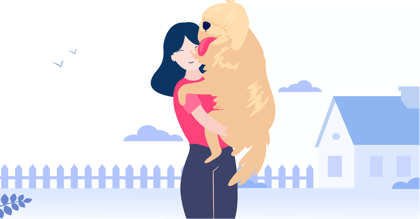
What to Do When You Get a New Dog?
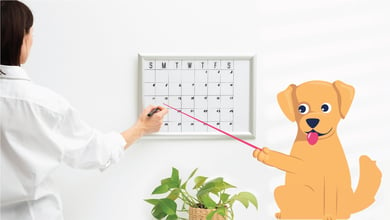
5-in-1 Vaccine for Puppies Schedule: Complete Guide
Didn't find what you need? Use the search!
Pet Keen is reader-supported. When you buy via links on our site, we may earn an affiliate commission at no cost to you. Learn more .
Puppy First Vet Visit Checklist: A Vet-Approved Guide
Vet approved
Reviewed & Fact-Checked By
Dr. Chyrle Bonk
Veterinarian, DVM
The information is current and up-to-date in accordance with the latest veterinarian research.
A puppy’s first vet visit can be overwhelming for both puppies and their parents. Knowing what to expect and how to prepare can help calm nerves and make the appointment go as smoothly as possible.
Each vet clinic will have its own procedures, but they generally accomplish the same things. We’ll go over some items that you can prepare before your puppy’s first vet visit and what sorts of things you can expect once you arrive at the vet clinic.
The 5 Things to Prepare Prior to the Visit
1. previous medical records.
Bringing any of your puppy’s existing medical records (for example, if you purchased your puppy from a breeder) to your veterinarian’s office will ensure that all your puppy’s medical information is all in one place. Veterinarians can also refer to these records to ensure that your puppy is on top of their vaccination schedule.
Most breeders and dog adoption centers will provide medical records when you first bring your puppy home. However, if you don’t have a copy, make sure to contact them before your first vet visit.
- 2. Comfortable Carrier
Young puppies can feel overwhelmed when they visit new places. A vet clinic can come with all sorts of sounds and smells that can make some puppies feel anxious. Assembling a cozy carrier can help your puppy stay calm. You can add a soft blanket, a plush toy, and any other of your puppy’s favorite and familiar items.
Carriers will also be a form of additional protection for your puppy. It’s likely that there will be other animals in the vet’s waiting room. A carrier will help keep your puppy in a safe space and removed from all the action.
- 3. Pet Wipes
It also doesn’t hurt to be prepared for any accidents along the way. Having a set of pet wipes can help you clean up any potential messes made in the carrier and keep your puppy clean during their first vet visit.
- Gentle Care For All Pets - Infused with moisturizing hypoallergenic ingredients & enriched with...
- Deep Cleans From Head to Tail - Tackle the toughest dirt & messes with our extra strong pet wipes...
- Freshness On The Go - Each dog grooming wipes pack contains 30 counts of premium dog wipes that...
If you're looking for an easy, safe way to clean your pet well-formulated wipes like Hepper's Wash Wipes might be just the thing. These premium wipes are designed to gently and effectively remove the dirt and grime that sticks to your pets's fur. The hypoallergenic formula is infused with soothing, moisturizing ingredients that are safe for all life stages.
At Pet Keen, we've admired Hepper for many years, and decided to take a controlling ownership interest so that we could benefit from the outstanding designs of this cool pet company!
- 4. Pre-filled Forms
Some veterinarians may request you to fill out forms before your first visit. These forms often collect basic personal information, such as your name, address, and phone number. They may also ask for any of your puppy’s existing medical records.
While you can certainly fill out these forms at the vet’s office, your puppy will appreciate having your undivided attention during their first vet visit. If your veterinarian doesn’t send you any forms to fill out beforehand, you can always ask if there’s anything you need to complete and submit before the visit.
- 5. Stool Sample
Most veterinarians will conduct a fecal exam on your puppy’s first visit. Fecal exams detect internal parasites, and work best on a fresh sample. You may wish to contact your vet beforehand to see if they will be performing this exam during your puppy’s visit so you can be prepared.
If so, make sure that your puppy has a good meal the night before. It’s also helpful to go on a walk before the vet visit. This will give your puppy plenty of time to relieve themselves and expend some energy. Make sure to double-bag the stool sample or place it in a tightly sealed container to prevent odors from permeating as you drive to the vet clinic.
The 6 Things to Expect During the Visit
- 1. Physical Exam
Once you and your puppy arrive at the vet clinic, you’ll check in with the front desk and wait for your veterinarian to see you. All puppies will go through a standard physical exam. They’ll get weighed, and the veterinarian will check out their whole body, including listening to the heart and lungs. In some cases, your vet may want some additional blood work or a urinalysis to get a baseline of your puppy’s organ function.
- 2. Diet and Nutrition Requirements
Make sure to ask your veterinarian about any diet and nutrition requirements for your puppy, as puppies of varying breeds and sizes have different nutritional needs. For example, smaller puppies usually have to consume more calories per pound of body weight than large-breed puppies. Having a feeding guide will help with giving your puppy healthy portions of food.
Your vet willl be able to provide information on what your puppy needs to eat for healthy growth and development. They can also recommend specific brands of puppy food that would be good options for your puppy.
- 3. Vaccine Schedule
One of the main things your veterinarian will start or continue for your puppy is their vaccine schedule. They will administer their core vaccinations, which target canine distemper, canine adenovirus, parvovirus, and parainfluenza. This vaccine is also known as the DA2PP, DHPP, or DAPP vaccine. Depending on where you live and your puppy’s lifestyle, additional vaccines, such as Leptospirosis, may be given or discussed as well.
Most puppies start their vaccine schedules when they’re about 6 to 8 weeks old. They’ll continue to get follow-up vaccines every 3 to 4 weeks until they’re about 16 weeks old. Once your puppy is over 12 weeks old, they can get the rabies vaccine.
- 4. Neutering or Spaying Questions
If you don’t plan on getting involved with breeding, consider having your puppy neutered or spayed at the appropriate age . Because different breeds have different maturation rates, it’s important to discuss with your veterinarian when it would be best for your puppy to have this surgery. Finding the right timing can immensely help with avoiding complications and will help your puppy have as smooth of a recovery as possible.
- 5. Tracking Healthy Growth and Development
It’s helpful to ask your veterinarian about what healthy growth and development look like for your puppy. They may recommend that you track your puppy’s height and weight regularly to ensure that they’re growing at a healthy rate. They can also give you information on best practices for feeding and exercising your puppy, as finding the appropriate amount for each is essential for healthy development.
- 6. Treats and Rewards
Bringing your puppy’s favorite treats to the appointment can help them stay calm as they go through a physical exam. If your puppy isn’t very food-motivated, you can try keeping them occupied with one of their favorite toys.
Getting through the first vet visit is a huge accomplishment for your puppy. So, make sure to provide plenty of praise and rewards. Providing rewards at the vet clinic can also help build a positive association for your puppy. Just make sure to find a secluded place to give your puppy a treat, as treats can attract and excite other dogs.
While it’s not possible to anticipate every single thing that will happen at your puppy’s first vet visit, you can do some things to make the experience as comfortable as possible for both of you. Making preparations beforehand can help immensely. It’ll also be beneficial to bring a list of questions so that you won’t forget to request any important information you may want about your puppy. Doing your best to be prepared will help you stay focused on your puppy and make the vet visit a positive experience for everyone involved.
- VCA Hospitals
Featured Image Credit: Nestor Rizhniak, Shutterstock
Nicole Cosgrove
Lead Pet Expert & Pet-ditor in Chief
- 1. Previous Medical Records
Related articles
How much exercise does an australian shepherd need vet approved advice, when will my labradoodle calm down facts & faq.
Search our database of over 16733 posts with up-to-date information from our experts and veterinarians.
Want to talk to a vet online?
Whether you have concerns about your dog, cat, or other pet, trained vets have the answers!
Be a smarter pet parent
Next time, skip the web. Get health tips and wellness advice for your pet straight to your inbox.
- dog parent basics
How to prepare for your puppy’s first vet visit
Learn how to prepare a proper puppy checklist ahead of your pet’s first veterinarian visit.
— Medically reviewed by Dr. Erica Irish
Everything we create is factually accurate and biased toward science → meet our team of experts
Dr. Dwight Alleyne
Updated December 12, 2023
When to schedule your puppy’s first vet visit
Before your puppy’s first vet visit, your new puppy’s first vet visit, after your puppy’s first vet visit, the cost of a vet visit, frequently asked questions, the essentials.
- Puppies need their first vaccinations at 6-8 weeks — The first round of core vaccines should be given around the time puppies get adopted, or even before that, depending on the breeder or shelter.
- Pet care costs can vary greatly — Some pet insurance plans cover routine care, but most don’t. It’s best to save up a few hundred dollars ahead of time so you’re prepared whether you plan on paying out of pocket or not.
- Make follow-up visits a part of your routine— Puppies should go to the vet every few weeks from the age of six weeks to four months to receive vaccinations and undergo routine wellness checks.
Your puppy’s first veterinarian appointment is a crucial step to starting on the road to a healthy life. Before you bring your new puppy home, you’ll want to schedule their first vet appointment so you can get started on the right track. Puppies should go to their first vet visit around six to eight weeks old so that they can receive their first round of vaccinations .
If you rescued your pup from a shelter, they’ve probably already received their shots and may be spayed or neutered . However, it’s still a good idea to take them to the vet as soon as possible to establish a complete medical record and catch any potential health issues . It’s important to make your puppy’s first visit a positive experience, so be sure to do your research and gather essential supplies before you go so you feel prepared and relaxed.
The best time to take your puppy to the vet is as soon as you can after bringing them home. Very young puppies have antibodies from their mother’s milk that protect them against diseases; however, these antibodies start wearing off at around six weeks old, leaving them with a vulnerable immune system. This is when it’s recommended for them to get their first vaccines and around the time many people adopt.
Another reason to schedule your first vet visit early on is to get started on what the American Veterinary Medical Association calls the “ veterinary-client-patient relationship (VCPR) . Trusted Source American Veterinary Medical Association (AVMA) Not-for-profit organization representing 97,000+ vets. Go to source ” This refers to the three-way relationship between you, the vet, and your puppy. It’s important to have this relationship early on so the vet can get to know your pup and comfortably diagnose them if and when any future health conditions arise.
A preliminary check-up is helpful even for healthy puppies because it can establish a baseline of normal behavior for your pup and make them feel like going to the doctor can be a positive experience since they don’t just go when they’re sick.
⚠️Never adopt a puppy that’s younger than 8 weeks old. Puppies should stay with their littermates until they’re at least 8 weeks old to receive the nutrition they need from their mother’s milk and for social training with their littermates. Puppies who are adopted out too early may be more likely to develop behavioral problems and may fail to thrive.
If you adopt a puppy from a shelter, they’ve likely already had at least some vaccines and may be spayed/neutered. Their medical record should be included in their adoption folder, and you’ll need to take it with you to the initial visit to the vet. If you buy a puppy from a breeder, they may or may not have had any medical treatments yet, so be sure to ask for papers.
Make sure to bring any medical records you may have received from the breeder or shelter with you on your puppy’s first veterinary appointment.
New puppy checklist
Once you’ve made the appointment and brought your puppy home, there are still a few things you’ll need to do before loading them in the car and taking off to the local clinic. Here’s a short checklist of what you’ll want to bring with you:
- Medical records including any current medications if applicable
- Stool sample in a sealed plastic bag
- Collar or harness
- Old towel or blanket
- Dog carrier
- List of questions or concerns
- Notes on what kind and how much food your puppy has been eating
If your vet lets you fill out their intake paperwork ahead of time, it’s best to try to write it all down at home instead of struggling with a squirming puppy in your lap. You should take your puppy into the office attached to a leash but try to keep them off the floor before they’ve had their vaccines to prevent them from being exposed to infectious diseases. If you feel like you can’t carry them in your arms or keep them in your lap, you might want to bring them in their crate instead.
Your puppy’s first consultation starts with a thorough exam around 6-8 weeks old. Your vet will thoroughly assess their skin , fur , eyes , ears , nose , mouth, teeth , feet , and genitalia. They will also weigh your puppy and check their heart rate. Finally, they will check for intestinal parasites and conduct a fecal exam. They’ll likely ask you to bring along a stool sample from your puppy, but they’ll let you know in advance. If they don’t ask, they will likely collect one during the appointment.
1. Vaccinations
Puppies are due for their first round of shots by the time they’re 6-8 weeks old. Since most reputable breeders start adopting their puppies out between 8 and 12 weeks old, chances are that they haven’t received all of their shots yet. On your initial vet visit, your puppy will often receive their first round of vaccinations .
On later trips, puppies will need further rounds of vaccinations (generally about every three weeks until 16 weeks of age). So remember to keep up with their vaccination schedule!
There are two core vaccines — The first is commonly noted as DAPP or DHPP . This combo vaccine protects puppies against canine distemper , canine hepatitis Trusted Source The Merck Veterinary Manual Trusted provider of veterinary medicine. Go to source , parainfluenza , and parvovirus . The second core vaccine is the rabies vaccine. This might be given on their first vet visit or follow-up appointments depending on the dog’s age and the relevant state laws .
There are also other non-core vaccinations — These will vary based on location and lifestyle, including whether pups spend more time outdoors or indoors, or are exposed to dog parks or other animals frequently. This includes canine influenza, leptospirosis Trusted Source Cornell University College of Veterinary Medicine Veterinary school. Go to source , and bordetella, or kennel cough . If you live in a rural area that sees a lot of snakes, your vet may also recommend a rattlesnake venom vaccine to give your dog some time in case they’re ever bitten far away from a hospital.
2. Preventative medications
You should talk to your vet about flea and tick control as well as heartworm prevention on your puppy’s first visit. Based on several factors, flea and tick prevention could consist of oral medication, topical treatment, or a specialized collar. The American Heartworm Society recommends year-round flea and tick prevention for all dogs in the USA. Many puppies are born with worms, so they will also need a dewormer.
3. Nutrition
Your vet will also be able to give you advice on what type of food your dog should be eating and how much at each life stage. It’s important to know what type of food you’re already feeding your puppy, as well as how much, and discuss these things with your vet. They’ll either approve it or may recommend a diet that’s more appropriate for their breed, life stage, or individual health.
Optional procedures worth discussing with your vet
Microchipping your puppy isn’t mandatory, but your vet will likely recommend it. The process involved inserting a small electronic chip between your dog’s shoulder blades. That way, if your dog ever gets lost, any vet will be able to identify them by scanning the microchip. You can have a microchip implanted during a regular visit or during the spaying/neutering procedure.
👉 If you prefer not to microchip, you might invest in a tracking device or a FidoTabby Alert collar in case they ever get lost.
Spaying or neutering may be something you’ll want to consider. Besides preventing unwanted canine pregnancy (and a large number of puppies in shelters), spaying and neutering have some benefits, such as reducing some health risks and helping with behavior problems.
“Most veterinarians recommend spaying and neutering around 6 months depending on the breed of the dog. Some veterinarians may recommend spay and neutering larger breed dogs at 1 year of age or older.”
Once that all-important first visit is in the books, it’s essential to follow up by scheduling future appointments for your puppy to complete their vaccination schedule. For most of the core vaccinations, puppies will need the first round at 6-8 weeks, the second round at 9-11 weeks, the third round at 12-14 weeks, and the fourth round at 16-17 weeks. After that, there will be booster shots when they’re a year old.
However, this schedule varies slightly from vaccination to vaccination. For rabies, the first vaccination will happen at around 12-16 weeks (depending on state law), and then there will be booster shots from 12-36 months depending on if they received the annual or 3-year rabies vaccine.
The price of your dog’s first veterinary appointment will depend on a variety of factors, such as your geographic location and the size of your pet. Some vet clinics may offer package deals to keep the costs down, such as veterinary wellness programs, but not all do.
Here’s a ballpark estimate of what you’d typically expect to pay individually for several procedures:
Spaying and neutering costs are more varied and often depend on the dog’s weight. Costs can range anywhere from around $45 at a low-cost clinic to as much as $300 or more at an animal hospital. Spaying will usually cost a bit more than neutering because it is a more complicated process.
If you want more details, you can always call your local vet office for a more precise quote, as well as any potential financing options, so you can know how to plan ahead.
Your puppy’s first visit to the vet can feel daunting, especially if you’re a new pet parent. However, once you’ve been a few times for regular visits, you’ll feel like a pro. Preparing everything you need beforehand can help you (and your new pet) feel more confident on the big day, and start them out strong for the amazing adventure you’ll have together in the years ahead.
How can I make my dog feel more at ease during their first vet visit?
Even though you’re not the one taking the shots, it’s natural for you to be nervous during your puppy’s first vet visit. However, dogs feed off your energy, and if you’re stressed out, that will make them stressed, too. It can help to make your vet appointment before you adopt, so you don’t have to worry about availability.
It might also be helpful to stop by the vet office beforehand, get the lay of the land, gather brochures and other information about vaccines, etc. and introduce yourself to the staff. If you’re more comfortable and relaxed in the setting, that can really help the puppy relax as well.
Would pet insurance cover my puppy’s first vet visit?
Pet insurance can literally be a lifesaver when it comes to emergencies and long-term illnesses. However, wellness visits aren’t always covered under typical policies. If your policy doesn’t cover routine exams, be sure to save up a few hundred dollars before you go or ask to see if you qualify for a payment plan, such as CareCredit.
When should a puppy go to the vet for the first time?
Puppies are due for their first round of shots by the time they’re 6-8 weeks old. Chances are, they’ll need their shots as soon as you bring them home. Even if you’ve adopted from a shelter or breeder who’s taken care of the vaccinations for you, it’s still a good idea to take your dog to the vet for a thorough examination to make sure there aren’t any health concerns. Establishing the relationship with your vet early can also make everyone feel more comfortable for any sick visits that may arise in the future. If your puppy’s health isn’t good, it’s especially important to go to the vet as soon as possible to receive an accurate diagnosis of your pet and receive necessary information about their condition, including medical advice for treatment.
How soon after I get a puppy should I take it to the vet?
Ideally, you should schedule your puppy’s first veterinary appointment before you bring them home so that you can take them within the first couple days after they’ve been adopted. If you couldn’t say no to the adorable eyes at the adoption event, just be sure to schedule them as soon as possible for a physical exam and to catch them up on any vaccines they may be missing.
How much does it cost to vaccinate a puppy?
There are two core vaccines for puppies, DAPP or DHPP, which is usually administered around 6-8 weeks, and rabies, which is legally due in most states by 16 weeks. Both of those vaccines together should cost between $75-$100, but the exact total will depend on factors such as your geographic location and the clinic that you choose. If you choose to include optional vaccines, such as Bordetella, it will cost you a little extra.
A dog tooth extraction costs, on average, between $500 and $2,500. Here's what else to expect before, during, and after the procedure.
Spaying and neutering can range from $0-$600. Here’s what you need to know about this important procedure.
Teaching basic commands like “Watch me,” “Sit,” and “Come” helps create a strong bond between dogs and their pet owners.
The Heimlich maneuver can make all the difference if your dog is choking. Learn how to safely perform this potentially life saving procedure.
9 Questions to Ask During Your Puppy's First Vet Visit
Are you prepared for your puppy's first vet visit? Here are 9 questions to ask pertaining to care, vaccination, diet, pet insurance, and socialization.
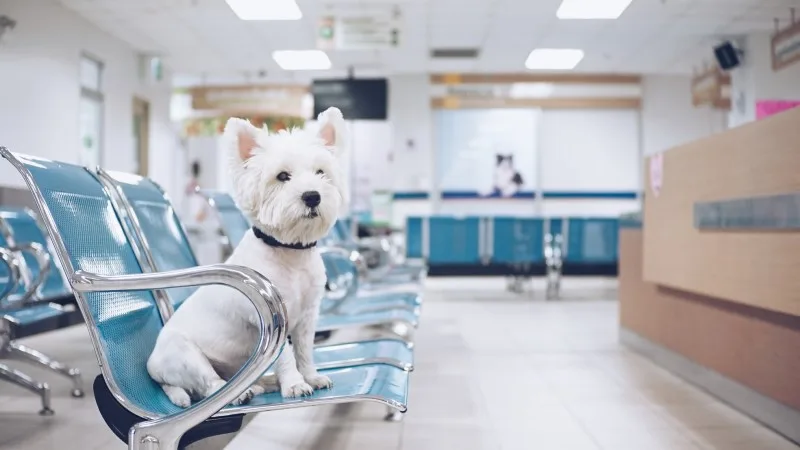
Raising a puppy is most definitely _not_a one-person job. Novice and veteran pet owners alike rely on a team of supporters to help keep their dogs happy and healthy from puppyhood into their senior years. Your vet is your most vital pet care partner, supporting you throughout each stage of your dog’s development, but they can’t do it all on their own either. You can make their job a little easier by doing your part at home and coming to every appointment prepared. Make sure to ask these questions during your early vet visits.
Is My Puppy Healthy?
Ailments may be the last thing on your mind when you admire your spry, young dog, but looks can be deceiving. Mild or even serious health conditions could be hiding just below the surface. During your initial veterinary visit, your dog’s new doctor will conduct a thorough evaluation to ensure they’re truly in tip-top shape.
What Should I Feed My Puppy?
A dog’s nutritional needs will evolve as they age. Puppies require a different assortment of vitamins, minerals, and other nutrients than adolescents, adults, and elderly dogs do. Dog food manufacturers offer a host of foods specially formulated for growing pups. Ask your veterinarian what types of food they’d recommend and how often you should feed your new pet.
Which Vaccinations Does My Puppy Need?
Most puppies require a number of vaccinations to protect their vulnerable immune systems and ensure they can safely interact with their four-legged peers. Your vet can inform you on the importance of each essential vaccine and help develop a schedule for return visits to get your puppy vaccinated.
When Should I Spay or Neuter My Puppy?
Unless you’re planning on breeding your pup, they’ll probably need to go under for surgery during their early months. The ideal time for spaying or neutering varies based on a dog’s size and breed. Trust your vet to guide you and help you make the right decision.
When Can I Walk My Dog?
Puppies are more vulnerable to infection and illness than older dogs. Discuss risk factors with your vet to determine when it’s safe to take a stroll with your dog and let them explore the outside world. You may not need to wait until they’ve undergone a full course of puppy vaccinations.
When Can My Dog Interact with Other Puppies?
As much as you may want to rush out to the dog park or schedule a puppy playdate, it may not be safe to socialize your puppy right out of the gate. Talk to your veterinarian about when and how you can safely introduce your puppy to other dogs.
What Types of Parasite Protection Does My Dog Need?
Pests like fleas, ticks, and heartworms are more than just a nuisance. They can seriously affect your dog’s health! Ask your vet about risk factors in your region to ensure you’re consistently doing everything you can to protect your dog.

How Can I Keep My Pet Healthy?
Providing for your dog’s health is a full-time job. Even without the assistance of your vet, there are plenty of steps you can (and should) take at home to ensure they’re always feeling their best. Make sure that topics like exercise, dental care, and nutrition factor into your early conversations with your vet.
Should I Purchase Pet Insurance?
A pet insurance policy offers peace of mind and financial reimbursement throughout a dog’s life. Though the industry is growing rapidly, a vast majority of dog owners still haven’t purchased policies for their pooches. Ask your insurance agent about how insurance can help address the financial burdens of pet healthcare.
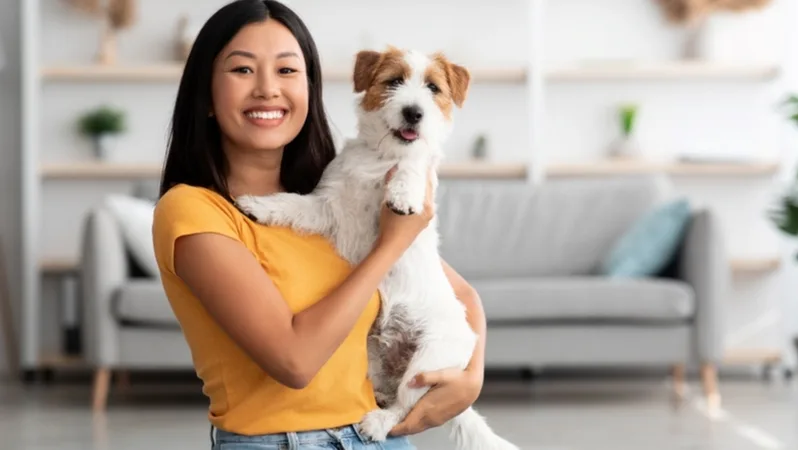
Every Dog and Cat Deserves the Pet Insurance of Champions
Get prize-winning care for your pets.

Related Articles

Top 8 Questions When Getting a New Puppy
Discover answers to commonly asked questions about bringing home a new puppy, things you need for a puppy, puppy care, puppy diet, and much more!

Recipes for Dog Birthday Cakes & Treats
Discover dog birthday cake recipes to celebrate your pup's special day. Bake a cake or try out our other DIY recipes for amazing dog birthday treats.

Meet the Bracco Italiano: AKC’s 200th Breed
Meet the Bracco Italiano: The American Kennel Club's 200th Dog Breed. This energetic sporting dog is personable & passionate, suited for both hunting & family life.
- Our Hospital
- Why Trust Us?
- COVID-19 Protocols
- Wellness Plan Benefits
- Medium Dogs
- Vaccinations & Prevention
- Routine Exams
- Internal Medicine
- Emergency Care
- Dental Care
- Senior Pet Care
- Puppies & Kittens
- New Patient Form
- Pet Care Tips
- Financing Options
- Book Appointment
- 12443 Poway Rd Poway CA 92064 US
- (858) 486-8860
- Emergencies
Puppy’s First Vet Visit: Checklist & What to Expect

You've got all the essentials for your new puppy, and you've booked their first vet appointment. Our Poway veterinarians explain what to expect and what to bring to your first appointment.
What Happens During the First Vet Visit?
During your puppy's first visit, a veterinarian should do the following:
- weigh the puppy
- listen to the heart and lungs
- take puppy's temperature
- examine the puppy's eyes, ears, nose, feet, and genitalia
- examine the puppy's skin and coat
- look at the puppy's teeth and mouth
- palpate abdomen and lymph nodes
- examine the feces for the presence of worms (you should bring a stool sample if you can)
- discuss the puppy’s history and any questions you might have about feeding, medical issues, and future care
- if you are going home with medications or treatments, make sure that you understand when and how they are to be given. Follow directions to the letter, and set up a schedule for follow-up visits and vaccinations.
What Should I Bring to the First Vet Visit?
If possible, try to bring the following items to your puppy's first veterinary appointment. The more information the vet has, the better they will be able to treat your puppy.
- any veterinary records you received from the breeder or shelter
- a written list of important questions or concerns that you might have
- notes on how much of what types of foods and treats you offer at home
- a dog carrier or crate lined with some old towels or shirts that smell like home
- a leash and collar or harness
- a chew toy for distraction
- small treats to reward good behavior
- any forms provided by your veterinarian that you have already filled out
- a stool sample, as fresh as possible
Note that small puppies will be more comfortable and safe in a crate. Don't expect to be able to carry a wiggly puppy in your arms when visiting the clinic. Puppies must be kept under control at all times using a leash and collar or harness. This is why a chew toy or some treats are a good idea.
What Should I Ask the Vet During the Puppy's First Visit?
Your veterinarian should be able to give you all of the information you require to help your puppy grow. Based on the information above, if you have any questions that you believe they have overlooked, or if the information they have supplied is confusing, don't hesitate to ask for clarification.
Having said that, a list of questions can help make the most out of your first visit. Here is a list of some good questions to ask your vet during the visit.
Health & Safety
- How often does my puppy need to come to the vet?
- When should I spay or neuter my puppy?
- Should I microchip my dog?
- How many times a day should my puppy poop?
- Are there any health concerns specific to my puppy’s breed(s)?
- Does my puppy need flea and tick prevention?
- What is heartworm disease and why is prevention important?
Training & Behavior
- When can my puppy go to the pet store/dog park/groomer?
- Do you recommend crate training?
- How long can she stay in her crate?
- How do you potty train a puppy?
- How much exercise does my puppy need?
- How do I socialize my puppy with other humans and dogs?
- Do you know any local trainers?
- What should my puppy eat?
- How many times a day should my puppy eat?
- When do puppies switch to adult dog food?
How Much Will My Puppy's First Vet Visit Cost?
The majority of what happens during a puppy's first vet appointment is routine, but costs can be determined by a variety of factors like location, vaccines, and prescribed medications. Veterinary wellness programs , vaccination clinics, and pet insurance can all help you save money. You can contact your vet directly for a more precise quote so there are no nasty surprises.
Are you getting a new puppy? Contact Advanced Care Veterinary Hospital for all your puppy's essential needs such as core vaccinations and parasite prevention.
New patients welcome.
Advanced Care Veterinary Hospital is accepting new patients! Our experienced vets are passionate about the health of Poway companion animals. Get in touch today to book your pet's first appointment.
(858) 486-8860 Contact Open Menu Close Menu
Welcoming You Back to Our Hospital
Please contact our team if you have any questions, or to book your pet's appointment.
- Our Hospital
- Why Trust Us?
- Photo Gallery
- COVID-19 Protocols
- Vaccinations & Prevention
- Routine Exams
- Emergency Care
- Dental Care
- Senior Dogs & Cats
- Puppies & Kittens
- Patient Information
- Client Forms
- Pet Vet Tips
- Financing Options
- 3320 W Broad St Richmond VA 23230 US
- (804) 353-4491
- Request Appointment
Puppy’s First Vet Visit: Checklist & What to Expect
If you're a new puppy parent, our Richmond veterinarians will guide you through everything you need to know for a successful first vet visit. Get ready with a comprehensive puppy first vet visit checklist.
When should you take your puppy for its first vet visit?
Schedule a first vet visit for your new puppy within a few days of bringing them home.
The vet will review their records, perform a physical exam, and check for health concerns. Puppies typically have appointments every 3-4 weeks starting at 6-8 weeks old, and ending at 4-5 months old.
First vaccinations usually begin at 6-8 weeks old. If your puppy is older than 4-5 months, they can be vaccinated in two visits spaced 3-4 weeks apart. Your vet may adjust the plan based on your puppy's needs.
Before your appointment, you should collect as much information as possible.
Puppy’s First Vet Visit Checklist
- Any veterinary records you received from the breeder or shelter
- A written list of important questions
- Notes on how much of what types of foods and treats you have
- Dog carrier or crate lined with some old towels
- Leash and collar or harness
- Chew toy for distraction
- Small treats to reward good behavior
- Any forms provided by your vet that you have already filled out
- A stool sample, as fresh as possible
Small puppies will be more comfortable and safer traveling in a crate. Do not assume that you will be able to hold your puppy in your arms when they experience all the new sights, sounds, and smells at the clinic. It is important to bring a harness or leash to control your dog if they are feeling stressed.
What to Expect During Your Puppy’s First Vet Visit
Veterinary staff will start the visit by asking you a series of questions about your puppy’s history and how they are doing at home, followed by:
- A weight check
- A complete physical examination, which includes
- Observing the puppy move around the exam room
- Looking at the whole body including the eyes, ears, nose, feet, nails, skin, coat, and genitalia
- Using a stethoscope to listen to the heart and lungs
- Checking reflexes
- Measuring temperature and pulse and respiratory
- Opening the mouth to check out the teeth, gums, and other structures
- Checking the eyes and ears
- Palpating the lymph nodes, joints, and organs within the abdomen
Throughout all the new puppy vet visits, the veterinary staff will discuss many important aspects of puppy care with you including
- Dental care
- Grooming needs
- Flea, tick, heartworm, and internal parasite control
- Vaccination schedules
- Exercise and play requirements
- Behavior and socialization
- Pet identification, including microchips and tags
- Reproductive health, including the benefits and risks of spaying and neutering
- Travel requirements
- Pet safety and disaster preparedness
- Diseases that can be spread from pets to people (and vice versa)
Questions to Ask the Veterinarian
Your vet will provide all the necessary information to care for your puppy, but be sure to review the important topics. If you have any questions or need clarification, don't hesitate to ask.
You probably have many questions if you have just got a new puppy, and it is time for their first appointment. Feel free to contact our Richmond vets with any questions or concerns about your first appointment.
Looking for a new vet we are accepting new patients .
(804) 353-4491 Contact Open Menu Close Menu
- Skip to primary navigation
- Skip to main content
- Skip to primary sidebar
- Skip to footer

Dog's Best Life
The information you need to keep your dog happy, healthy, playful and loyal.
9 tips to make your dog’s first vet visit successful
PUBLISHED: June 6, 2022 | UPDATED: October 6, 2023

You are the most critical person in your dog’s life; there’s no doubt. But there’s also another person that your pet will need, their veterinarian. Veterinarians do their best to keep animals healthy and care for them when they get sick.
To stay healthy, dogs require regular exercise, proper nutrition, and, most importantly, consistent medical care. Animal doctors can assist you with all these three critical components so your pet can live a healthy lifestyle.
Although many dogs are scared when visiting their vet , it doesn’t necessarily mean it’s a bad experience. Going to the veterinarian is a must, especially if you have a new puppy. And it’s your job to help your puppy adjust and have a positive experience every time you visit their vet.
Keep reading to learn nine tips to prepare for your dog’s first vet visit.
Don’t delay your dog’s first vet visit
Even though your new pup may look healthy from the outside, you’ll never know how he feels from the inside unless you have him checked by a veterinarian. You must get your dog examined as soon as possible after buying him or bringing him home from a shelter.
The vet can detect medical issues that are not apparent at first. Also, scheduling the first visit can help establish rapport with the veterinarian. This is important, especially when your dog gets sick or has an emergency , to receive immediate care.
Find the right veterinarian
Finding the right veterinarian will be essential for keeping your pet healthy. They are as important as the pet owner. Your dog will see the vet throughout many stages of their lives , so it is crucial to find someone who will treat them with compassion and understanding.
To find the right veterinarian, you can ask for referrals from friends, neighbors, and family members. Word-of-mouth is often more reliable than online reviews, so seeking referrals is always good. Speaking with local people about veterinary services in your area will give you an idea of what others say about the clinic.
Schedule an appointment
After finding the right veterinarian for your puppy, it’s time to make that call to schedule an appointment.
It’s best to schedule your vet visit in the morning when delays are less likely, and there are fewer people. This is especially true if your dog hasn’t completed his vaccinations yet because he’s still susceptible to diseases. For that reason, you should also be consistent in keeping up with your puppy’s vaccination schedules in the long run.
Scheduling the appointment when there are fewer people can also help ease the anxiety that your pet may feel since it’s their first time in a vet clinic. You may also want to go to the clinic ahead of time to avoid traffic and help get your pet settled in, as you may be required to fill out some paperwork.
Prepare for your first vet visit
As you schedule an appointment at a vet clinic, a receptionist or the veterinarian will tell you to bring a couple of items on your first vet visit. Usually, vets require you to bring a copy of your pet’s medical records and all paperwork from the breeder, shelter, store, or rescue organization. Also, don’t forget to bring any medications that your puppy takes.
Furthermore, vet clinics will require you to fill out a new patient information form upon arrival. If the clinic offers patient forms online like Sunnyside Veterinary Clinic does, that’s even better. Just be sure to fill them out first before heading to the clinic so your visit will go even more smoothly. A stool sample may also be required to test your puppy for intestinal parasites. So, don’t forget to collect a sample ahead of time and label it with your puppy’s name, your name, and date.
Don’t forget to prepare for the trip to the clinic so that your first vet visit will be a positive experience for you and your dog.
Help your pet adjust
Presumably, you and your puppy will be riding a car on your way to his first vet visit. You need to make sure that your pet dog is comfortable throughout the whole trip. You don’t want your dog to feel uncomfortable or throw up before reaching the clinic. This is why you must get your pet acclimated to the carrier.
You can have trials at home where you put your dog inside a pet carrier for a couple of minutes so he can get used to it. This way, he won’t feel uncomfortable on the way to the vet clinic.
Additionally, you may want to consider learning the proper placement of the pet carrier once inside a vehicle. Place the crate on the backseat floor for maximum stability. This way, your puppy won’t feel dizzy and throw up while on the road. Avoid placing the carrier on any seat as it may fall off. Lastly, don’t forget to check your pet for any signs of distress during the car ride.
Be a good example

One of the reasons dogs, especially pups, get uncomfortable when visiting a vet is because they sense their owner’s emotions. So, if you get nervous or show any signs of anxiety, your dog may also become anxious.
To prevent this from happening, you need to set a good example for yourself and try to relax. Treat it as a typical outing for you and your puppy. Upon arrival, greet the clinic staff cheerfully, and avoid spending too much time reassuring your dog. This way, you’ll both have a positive first vet appointment experience.
Socialize your dog
Many dogs tend to get anxious, weary, or nervous during their first vet visit because they are uncomfortable around new people. Some dogs struggle in a situation when people they don’t know handle them. Some may even show aggressive behavior as their defense mechanism against being surrounded by strangers.
Even if you don’t believe that your dog will behave this way, you’d be surprised to see how much his behavior changes when put in a stressful situation. To prevent this from happening, socialize with your dog early on as preparation for the scheduled appointment.
Try introducing him to new people and different kinds of situations. This way, he’ll learn to trust strangers and is less likely to show aggressive behavior when taking him to the vet. Establishing a mentality that vet visits are not scary during the first appointment will make your subsequent visits smoother and more pleasant for you and your pet.
Know what to expect
It can be helpful if you know what to expect during your dog’s first vet visit. Usually, a veterinarian will perform the following procedures on your puppy:
- Physical exam.
- Series of vaccines.
- If you didn’t bring a stool sample, the vet might try to obtain one.
- Flea treatment .
You should expect some fees when going to the vet. The overall cost of the appointment will depend on the procedures, your dog’s medical history, and your geographical location. On average, the fee ranges from $150 and above. Some clinics offer coupons or waivers for first-time patients, so take advantage of them.
Prepare for questions from the vet
The vet will ask a couple of questions regarding your dog. The first thing that they usually ask is how things are going so far with your new puppy. Be sure to express any concern, especially when you notice anything alarming or unusual with your pet. Typically, the vet may change his approach with the checkup depending on your answer. But if everything’s fine, the vet will ask a couple more questions about his eating habits, behavior, and other health-related issues .
This brief question and answer portion can also be your opportunity to ask for any advice on any eating, behavioral, or health problems that you’ve experienced so far. You can also ask the vet about any potential problems or concerns that you have. Prepare a list of questions so you remember everything and make the most of this opportunity.
Bottomline for a successful first vet visit
Veterinary visits, especially the first one, are essential for preventing and treating various conditions and diseases. Taking your dog to the veterinarian is critical for your dog’s health.
These vet visits will allow the veterinarian to pick up on any subtle changes in your dog’s health. Your vet will also understand your dog’s overall health and be able to give you tips on how to keep your pet happy and healthy.
Related Posts

Vet visit fear: Modify the negative association by making vet…

Routine vet checkup benefits include monitoring and protecting your dog's…

The Vets offers convenience by providing annual wellness exams, vaccines,…

Veterinary specialists train for three to five years. You can…
Quick Links
- Top Stories
Recent Posts
- How a canine partner can help your rheumatoid arthritis Dogs can provide emotional support, companionship, and assistance with everyday tasks for people with rheumatoid arthritis. […]
- Inside your dog’s mind: Decipher 6 odd behaviors for a happier pet If your dog exhibits weird behavior, understand six potential reasons and learn what you can do to address the situation effectively. […]
- Understand the differences in the 5 American Bully breeds Although the American Bully looks ferocious, the dogs are calm and collected and considered family pets because they are good with children. […]
- Burglars beware: Even small pups can help protect your home A guard dog dramatically reduces the likelihood of a break-in. Also, consider other safety measures like security cameras and motion-sensor lights. […]
Get Our Newsletter
Get more news to help keep your dog healthy delivered right to your inbox. Sign up for DogsBestLife.com's monthly newsletter.
Email address:
By entering your information, you agree to allow us to contact you in accordance with our privacy policy.
You can see how this popup was set up in our step-by-step guide: https://wppopupmaker.com/guides/auto-opening-announcement-popups/
How To Prepare for Your Puppy’s First Vet Visit

In This Article
Getting a puppy can be an exciting yet overwhelming experience for new pet parents. While buying all the necessary items for your new pup , such as a collar, puppy food, and toys, is important, scheduling your puppy’s first vet visit should be at the top of your to-do list.
Here, we will discuss a few helpful tips that will ensure you feel better prepared to navigate this visit and understand what to expect to keep your puppy healthy and happy.
Bring Your Puppy’s Records
It is essential that you bring all of your puppy’s health records with you to the first vet visit . If you adopted your puppy from a shelter, they should have provided you with this paperwork. If your puppy is from a breeder, bring the pup’s paperwork as well as any information you have about the parents’ health history.
Health records detail what veterinary care your puppy has already received and what he is still due for. This includes vaccines , stool and blood testing, deworming, and other medications.
Your veterinarian is your best source of information and guidance as you learn how to care for your new puppy.
Without paperwork, your veterinarian will likely need to start from scratch and may end up repeating medical care that has already been given. While this is not necessarily harmful for your puppy, it does result in additional expenses for you that could have been avoided.
Be sure to bring your puppy to see a veterinarian within one week of bringing him home. This will ensure that a health plan is made to protect him against common puppy dis eases, such as parvovirus and distemper, right away.
What Happens During a Puppy’s First Vet Visit?
During your puppy’s first vet visit, your veterinarian will do a comprehensive head-to-toe exam to identify any concerns and rule out congenital abnormalities, such as a heart murmur or hip dysplasia.
A stool sample will be collected to test for intestinal parasites, which are very common among puppies, including roundworms , hookworms , and whipworms . Deworming medication will be administered, even if the stool sample is negative. This is because parasite eggs are intermittently shed in feces and may not always be detected during testing. Your puppy will likely receive several deworming medication doses during his puppy visits.
If your puppy is at least 6 months of age , a blood sample will be collected to check for heartworm disease . Puppies under 6 months of age do not need to be tested, because heartworms take approximately six months to grow into adults that can be detected by this test. Before this timeframe, the test will yield a negative result.
If your puppy has already received some vaccines, your veterinarian will review her medical records and discuss a future vaccine schedule. You can review the chart below, which details what vaccines to expect at different ages for your puppy.
All puppies should receive the rabies and distemper vaccines; however, your veterinarian may recommend additional vaccines, such as Lyme , leptospirosis , and Bordetella, based on your puppy’s lifestyle.
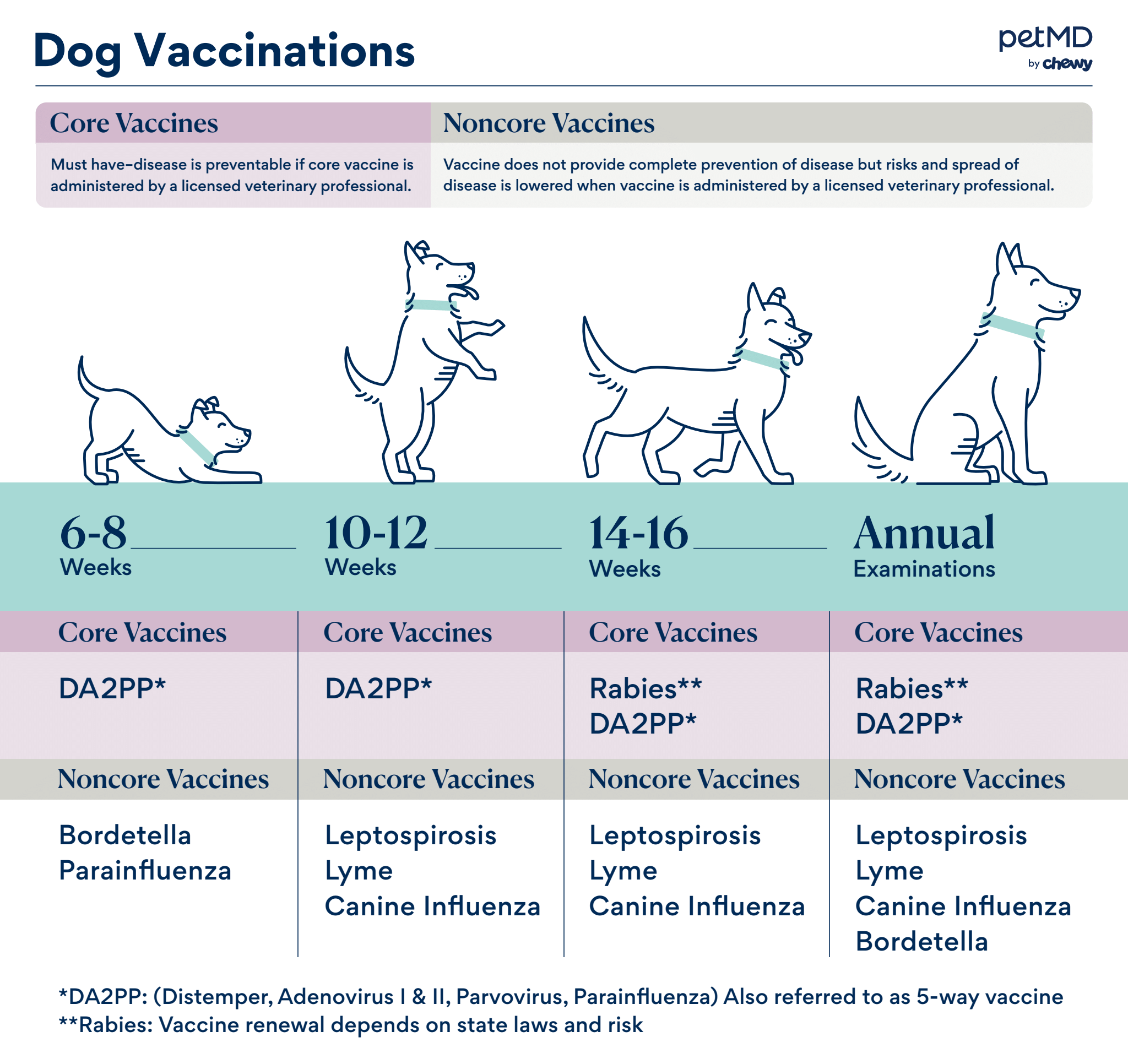
Your veterinarian will also discuss spaying or neutering your puppy. This surgery is recommended for all dogs to reduce the risk of certain behavioral and health concerns in the future. Unspayed female dogs are at higher risk for mammary cancer and uterine infections, while unneutered males have an increased risk for testicular cancer and behavioral problems, such as aggression.
While most dogs benefit from this surgery around 6 months of age, your veterinarian may recommend waiting to spay or neuter large-breed dogs until they finish growing. This decision is made on an individual basis while weighing the risks and benefits. It is also recommended to get your puppy microchipped at the time of this surgery.
Finally, your veterinarian will educate you on the best flea/tick and heartworm preventatives for your puppy and emphasize the importance of maintaining year-round coverage to keep them protected from these parasites.
What To Expect During Puppy’s First Exam
Knowing what to expect during your puppy’s first exam can alleviate any uncertainties and help prepare you with questions or concerns you may want to bring to the veterinarian’s attention.
During your puppy’s first vet visit, you can expect the veterinarian to do the following:
Weigh your puppy
Check your puppy’s temperature
Listen to your puppy’s heart and lungs
Conduct a comprehensive head-to-toe exam to identify anything unusual
Discuss your puppy’s history and any medications currently being taken
Recommend appropriate diets and feeding guidelines
Create an appropriate vaccine schedule
Administer vaccinations and deworming medication
Collect a stool sample to identify intestinal parasites
Collect a blood sample to rule out heartworm disease (for puppies 6 months or older)
Explain obedience and potty-training recommendations
Prescribe flea, tick, and heartworm preventatives
Answer any questions you may have
Your veterinarian is your best source of information and guidance as you learn how to care for your new puppy. Never hesitate to bring up any concerns you may have so that they can be addressed. It might be helpful to write down a list of questions you wish to discuss with your veterinarian before this initial visit.
How Much Does a Puppy’s First Vet Visit Cost?
A puppy’s first vet visit is typically extensive and comprehensive, making it more expensive than subsequent visits.
The cost of a puppy’s first exam generally ranges from $40 to $65. Then you’ll need to add the cost of vaccines, diagnostic testing, and any other medications needed. The initial set of vaccines can cost between $200 and $250, with each additional booster dose costing around $50.
Intestinal parasite screening is also part of the initial visit and can range from $20 to $30, with deworming medication costing about $10 to $20 per dose. All in all, pet parents can expect to spend about $300 to $350 for an initial puppy visit.
You can also discuss pet insurance with your veterinarian and determine if it makes sense for you and your pet, especially to potentially offset additional vet costs down the road.
When To Take Your Puppy to the Vet Immediately
Puppies are at an increased risk of sickness due to their developing immune system. They frequently experience intestinal parasites, upper respiratory infections , and fleas .
Parvovirus , distemper , and kennel cough are common among puppies, especially those who are unvaccinated.
While your veterinarian will do a thorough checkup at your puppy’s first visit, it is important to call your veterinarian if your puppy does not seem to be feeling well or is not acting like themselves. Symptoms that warrant an immediate call to your veterinarian include:
Thick, yellow or green eye and nose discharge
Bloody urine
Vomiting or diarrhea
Visible signs of worms in stool
Excessive lethargy
Pale or dry gums
Decreased appetite
Excessive itching and/or hair loss
By reaching out to your veterinarian at the first sign of illness, your puppy can receive the appropriate care and treatment needed to feel better sooner and avoid worsening symptoms.
Featured Image: Manu Reyes/iStock via Getty Images Plus

Veterinarian
Dr. Brittany Kleszynski is a veterinarian and freelance medical writer who specializes in creating meaningful content that engages readers...
Help us make PetMD better
Was this article helpful?
Related Articles

Subscribe to Our Newsletter
Sign up for weekly pet health tips and insights from our veterinarians.
Would you like to switch to the accessible version of this site?
Don't need the accessible version of this site?
(408) 248-3844
Open 7 days a week 10am-10pm
3100 El Camino Real Santa Clara CA 950 51
Phone: (408) 248-3844
[email protected]
Connect With Us
- Ask about our puppy and kitten packages! Savings of up to $300! Click here for more information
- Got Stinky Breath? DENTALS Dogs $475* Cats $375* LEARN MORE HERE
- Open regular business hours 10am-10pm! Wear Protection, Come In... LEARN MORE HERE!
- Open During Covid 19. Open Door Come Inn Click Here!
- Emergencies, Surgery, Ultrasound, Radiology and much more... 10am-10pm / 7 days a week
- Caring For All Animals All animals deserve compassionate veterinary care. Call today. Request Appointment
Online Forms
Request an appointment, welcome to silicon valley pet clinic & urgent care your veterinarian in santa clara,ca call us at (408)248-3844, pet emergency call us right away at (408)248-3844 .
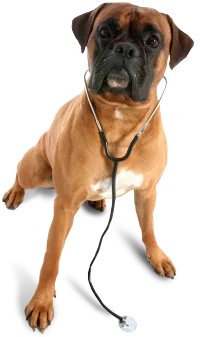
If you live in Santa Clara or the surrounding area and need a trusted veterinarian to care for your pets – look no further. We are licensed California veterinarians, treating all types of pets. Your pets’ health and well being are very important to us, and we take every possible measure to give your animals the care they deserve.
Silicon Valley Pet Clinic & Urgent Care is a full-service animal hospital and welcomes both emergency treatment cases as well as pet patients in need of routine medical, surgical, and dental care. We have years of experience treating serious conditions and offering regular pet wellness care. Beyond first-rate pet care, we make our clinic comfortable, kid-friendly, and calm, so your pet can relax in the waiting room and look forward to meeting our Santa Clara veterinarian.
We are happy to offer a number of resources that enable you to learn about how to take better care of your pets. Please feel free to browse our site, particularly the informational articles. The best veterinary care for animals is ongoing nutrition and problem prevention, so becoming knowledgeable about preventative pet care is essential to the ongoing success of your animal’s health. If you have any questions, call (408) 248-3844 or contact us and we'll promptly get back to you. Our Santa Clara veterinarian office is very easy to get to - just check out the map below! We also welcome you to subscribe to our newsletter, which is created especially for Santa Clara pet owners.
At Silicon Valley Pet Clinic & Urgent Care, we treat your pets like the valued family members they are.
Santa Clara | Veterinarian: Dr. Gahra |Silicon Valley Pet Clinic & Urgent Care | (408)248-3844
3100 A El Camino Real Santa Clara, CA 95051
Find us on the map
Working hours, our regular schedule.
10:00 am - 10:00 pm
Featured Articles
Read about interesting topics, april newsletter: the benefits of dental chews for dogs.
Could dental chews help your dog's pearly whites? ...
April Newsletter: At What Age Should You Spay or Neuter Your Pet?
Not sure when to spay or neuter your new pet? Take a look at the latest surgery recommendations. ...
March Newsletter: Tips to Prevent Your Cat from Overgrooming
Is your cat's overgrooming habit causing hair loss or irritated skin? Find out what you can do about the problem. ...
March Newsletter: How and When to Introduce Solid Food to Your Kitten
Do you know when your kitten should start eating solid food? ...
February Newsletter: What Causes Nausea in Cats?
Think your cat may be nauseated? These conditions, illnesses and diseases could explain why your pet doesn't feel well. ...
February Newsletter: The Benefits of Proper Nutrition for Pets
How's your pet's diet? ...
January Newsletter: How Veterinarians Treat Arthritis in Dogs
Wondering what you can do about your dog's arthritis? ...
January Newsletter: How Your Veterinarian Can Help with Lameness
Wondering why your pet is lame? Your veterinarian can provide the answer. ...
December Newsletter: What Causes Stomatitis in Dogs?
Does your dog have sores in its mouth? Stomatitis, an oral health condition, could be to blame. Dental cleanings and home dental care can help ease your pet's painful symptoms. ...
December Newsletter: What is the 3-3-3 Rule When Adopting a New Pet?
Adopting a pet? You need to know about the 3-3-3 rule. ...
Newsletter Sign Up
Sign up for more articles, the word of mouth, what our patient say.
- " My dog Buster was in pain and wasn’t acting like himself. I scheduled an appointment with Dr. Gill ASAP. He did a remarkable job during the initial exam to diagnose the problem and recommend additional treatments/services to relieve the pain Buster was in. After doing X-rays and blood work it was determined my little guy was suffering from intervertebral disc disease. " Jotika
- " This place was awesome. They took such good care of my giant Rottweiler during an emergency. They even called the next day to check up on her. The price was reasonable too. Went back again and the treatment was great yet again. Love that they stay open late and open everyday. So convenient. Thanks guys for treating my girl as is she was family! " Mea
- " I’m planning to travel with my baby cat. In order to do that she has to do a Rabies Neutralization Antibody Testing from certified lab. I was lucky to reach out Dr. Gill. He explained to me throughly and helped me to get it done. I would recommend Dr. Gill to everyone who needs professional and friendly help on their loved pets. " Hsinti
- " I’m very happy with the service and prices of the Silicon Valley Pet Clinic. I have gotten quotes from other vets around and SVPC offers the best value! I took my dog in to get some growths removed and get this teeth cleaned. " Katie
- " My 16 yr old cat Pete had some green discharge coming from his eye. I recently brought a feral kitten in to care for that my cousin found. I figured that Pete probably got scratched in the eye from the little guy. " Jeanna
- " I was very nervous to have her spayed, especially after going through an episode of Giardia. She has been dealing with poop that is not consistent and we are doing some probiotic treatment. " Connie

How Often Should I Take My Dog to the Vet?
Gauging how much veterinary attention your dog should receive requires having a good grasp of what dogs need at different points in their lives. In order to maintain their pets’ health, dog owners must be in tune with these needs and provide vet care accordingly. Read on to find out how often you should take dogs to the vet based on their needs, from puppyhood to their golden years.
Vet-visit frequency according to your dog’s age and health condition
Unless there’s an immediate threat to your dog’s health or signs of an illness or injury, the frequency at which they should visit the vet hinges on the life stage they’re at and on whether or not they’re in good health.
If you’re worried about the costs of all the vet visits you’ll need to make, check out our list of the best pet insurance companies in 2024.
As many dogs are adopted when they’re only eight weeks of age (approximately two months old), owners should immediately schedule a vet visit for an initial examination to take care of common puppy health issues like intestinal parasites. During your puppy’s first year, their vet visits will mostly consist of immunization as well as heartworm, flea and tick prevention.
Puppies are required to get rabies vaccines in most states. Another core vaccine that will be administered to your puppy is the distemper combination vaccine, which protects against canine distemper, canine adenovirus types 1 (hepatitis) and 2, canine parainfluenza and canine parvovirus. Noncore vaccines the vet may recommend for your puppy include vaccines for bordetella (kennel cough), leptospirosis, lyme disease, canine influenza and even rattlesnake poison.
Among your puppy’s visits to the vet, you also have to schedule for them to be spayed or neutered. Spaying and neutering is usually done when a puppy is over six months old. However, some giant breeds may need to be sterilized once they reach adulthood.
Healthy adult dogs
Adult dogs that are healthy will only need to be taken in for annual wellness exams. During these visits, your dog can also receive preventive care and all of their booster shots.
Your dog’s health care should also include professional dental cleanings, which experts recommend be done on a yearly basis. Taking care of your dog’s teeth will help avoid dental diseases and issues related to bad oral health.
Adult dogs with medical conditions
If your dog suffers from a condition that requires constant monitoring, they will probably need more regular checkups than an average healthy dog. Depending on the condition, your dog may need to get blood work and other tests aside from physical exams. Dogs suffering from certain illnesses, such as kidney disease, must also go to the vet more frequently to get treatments.
Senior dogs
Dogs are considered seniors when they’re over ten years of age, although it depends on the breed. Because older dogs are more likely to become ill, it’s important for pet parents to check in on their overall health more often. Bi-annual wellness checkups could help veterinarians catch signs of illnesses and begin treating dogs sooner.
How often you should take your dog to the vet FAQs
How many times should my puppy visit the vet, how often should my dog have a vet check-up, how do i know if i should take my dog to the vet, summary of money’s guide on how often to take a dog to the vet.
- The level of veterinary care and attention a dog needs will depend on how old and healthy they are.
- Puppies should visit the vet as many times as necessary in order to complete their vaccination schedules.
- Annual checkups are a good standard for adult dogs who are in good health.
- Senior dogs and adult dogs with health problems need veterinary attention on a more regular basis.
- Certain illnesses require treatments that in turn warrant more vet visits than others.
© Copyright 2024 Money Group, LLC . All Rights Reserved.
This article originally appeared on Money.com and may contain affiliate links for which Money receives compensation. Opinions expressed in this article are the author's alone, not those of a third-party entity, and have not been reviewed, approved, or otherwise endorsed. Offers may be subject to change without notice. For more information, read Money’s full disclaimer .
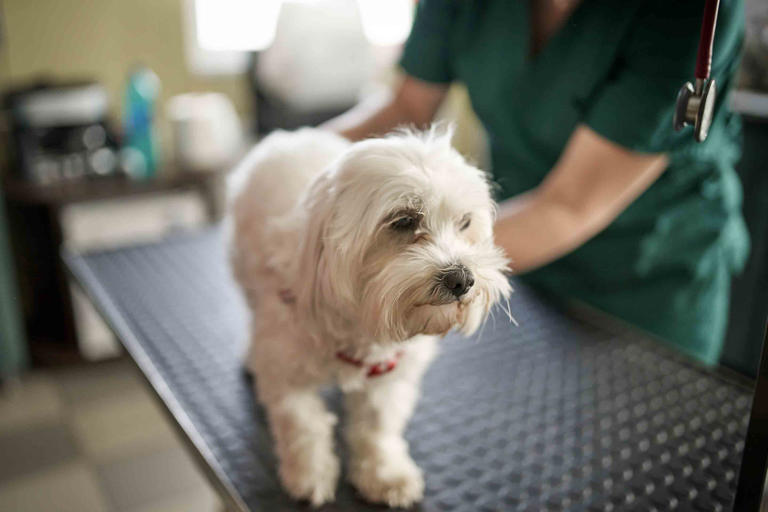
- All Wellness
- All Skin Care
- Moisturizers
- Mineral Sunscreens
- Sunscreens for Kids
- Sunscreens for Dark Skin
- SPF Lip Balms
- Under Eye Patches
- All Hair Care
- Purple Shampoos
- Thinning Hair
- Head Shavers
- Hair Dryers
- All Oral Care
- Electric Toothbrushes
- Toothpastes
- Mouthwashes
- Water Flossers
- Meal Kit Delivery
- Gluten-Free Meal Kit Delivery
- Disposable Face Masks
- Air Purifiers
- Eco-Friendly Laundry Detergents
- Natural Deodorants
- Period Underwear
- All Fitness
- Exercise Bikes
- Walking Shoes
- Fitness Trackers
- Reusable Water Bottles
- Blackout Curtains
- Sound Machines
- Home & Kitchen
- All Home & Kitchen
- Kitchen Appliances & Tools
- All Kitchen Appliances & Tools
- Coffee Makers
- Kitchen Gadgets
- Small Home Appliances
- All Small Home Appliances
- Air Conditioners
- Space Heaters
- Humidifiers
- Bedding & Bath
- All Bedding & Bath
- Bath Towels
- Silk Pillowcases
- Duvet Inserts
- Office Chairs
- Standing Desks
- Desk Organizers
- Seat Cushions
- Under Desk Ellipticals
- All Outdoor
- Raised Garden Boxes
- Garden Hoses
- Beach Towels
- Solar Pool Covers
- Grilling Accessories
- Electronics
- All Electronics
- Wifi Routers
- Gaming Consoles
- Streaming Devices
- Instant Cameras
- Handheld Gaming Consoles
- 3D Printers
- All Headphones
- Noise Canceling
- Wireless Earbuds
- Smart Gadgets
- All Smart Gadgets
- Smart Watches
- Smart Bulbs
- Garage Door Openers
- All Computers
- Gaming Laptops
- Laptops for College Students
- Computer Monitors
- Ergonomic Keyboards
- Dog Carriers
- Litter Boxes
- Scratching Posts
- Cat Carriers
- All Pet Care
- Nail Clippers
- Flea & Tick
- All Luggage
- Lightweight
- Weekender Bags
- Accessories
- All Accessories
- Luggage Tags
- Travel Pillows
- Tech Gadgets
- Packing & Organization
- All Packing & Organization
- Packing Cubes
- Toiletry Bags
- Gift Guides
- All Gift Guides
- Valentine's Day
- All Valentine's Day
- For Any Loved Ones
- Mother's Day
- All Mother's Day
- Last Minute Gifts
- Best Mother's Day Gifts
- For Moms Who Have Everything
- Best from Amazon
- All Graduation
- For College Grads
- For High School Grads
- For Teachers
- Father's Day
- All Father's Day
- Best Father's Day Gifts
- For Dads Who Love Fishing
- Holiday Season & Christmas
- All Holiday Season & Christmas
- Gifts Under $25
- Practical Gifts
- Other occasions & loved ones
- All Other occasions & loved ones
- For Grandparents
- For Bridal Shower
- For New Parents
- For Any Occasion
- Deals & Sales
- All Deals & Sales
- Most Popular This Month
- Sales This Week
- New & Notable
- What to Buy This Month
- All Sleep Week
- Body Pillows
- Sleep Week Sales
- Best of Wellness Awards 2024
- All Best of Wellness Awards 2024
- View all of the winners here
- Winners on Amazon
- CNBC Select
- All CNBC Select
- Credit Cards
- Small Business
- Personal Finance
- Credit Monitoring
- Help for Low Credit Scores
- Sign up for the Select Newsletter
- Check out Shop TODAY
- Privacy Policy
- Do Not Sell My Personal Information
- Terms Of Service
- NBC News Sitemap
Follow Select
The best dry dog food for every life stage, according to veterinarians
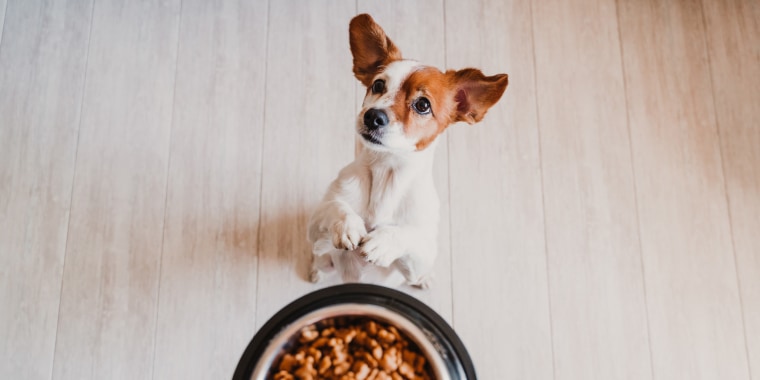
When choosing between wet and dry dog food , you and your pup’s personal preferences play a big role. Both dry and wet food can be good nutritional choices for your dog, but each comes with pros and cons, says Dr. Dottie Laflamme , an independent animal nutrition consultant. The best dry dog food is convenient, cost effective and can even benefit oral health . But keep in mind that canned food provides significantly more moisture than dry food, so consult your veterinarian if your dog has any conditions that might benefit from a moisture-rich diet.
While ingredient lists are informative, the quality of your dog’s kibble is primarily determined by four factors, according to Laflamme: palatability, a complete and balanced recipe, affordability and whether the food meets your veterinarian’s approval based on your dog’s nutritional needs.
To help narrow down the best dry dog foods , we spoke with veterinarians about how to identify a complete and balanced recipe for your dog’s diet. We also rounded up their recommendations for the best dry dog food to consider.
SKIP AHEAD Best dry dog food to consider this year | How to shop for the best dry dog food
Selected. Our top picks
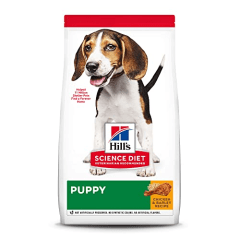
How we picked the best dry dog food
While comparing dry food for dogs offered on the market today, our experts recommend keeping the following factors in mind:
- Breed size: To ensure your dog gets the nutrients they need, it’s important to purchase the appropriate food for their life stage and breed size, which can be categorized into three stages: growth, all life stages and adult maintenance.
- AAFCO statement: If your dog’s dry food is labeled with a statement saying it meets the Association of Animal Feed Control Officials (AAFCO) recommendations through formulation or food-trial testing, it means that it contains all the necessary nutrients for your dog’s life stage and ensures a complete and balanced diet, says Dr. Anna Kaufman, a veterinarian at Bond Vet , which has locations across the United States.
- Nutritional guidance: A recipe created with the guidance of a board-certified veterinary nutritionist is more likely to provide the appropriate nutrients for your dog’s age and breed size rather than relying on marketing tactics. Key ingredients to look for include an animal protein source, whole grains or high-quality carbohydrates, fruits and vegetables and healthy fats, says Dr. Nicole Savageau, a veterinarian with The Vets , which offers mobile vet visits across the United States.
Price: “Dry dog food tends to be more cost-effective compared to wet dog food, primarily due to factors such as production costs, packaging, and shelf life,” says Savageau. If budget is a concern, dry dog food can be a more economical choice.” Given this, we considered a range of quality options at various price points.
Best dry dog food to consider this year
The following highly rated dry food share two important considerations: They meet or exceed the nutritional recommendations set by AAFCO and are formulated with the oversight of a board-certified veterinary nutritionist. These factors ensure that your dog is getting the right nutrients for their age and breed size. However, you should always check with your dog’s veterinarian first about your dog’s specific dietary needs in conjunction with age to get an expert read on any dietary needs or restrictions.
Best overall dry dog food for adult small breeds: Royal Canin
Royal canin small breed adult dry dog food.
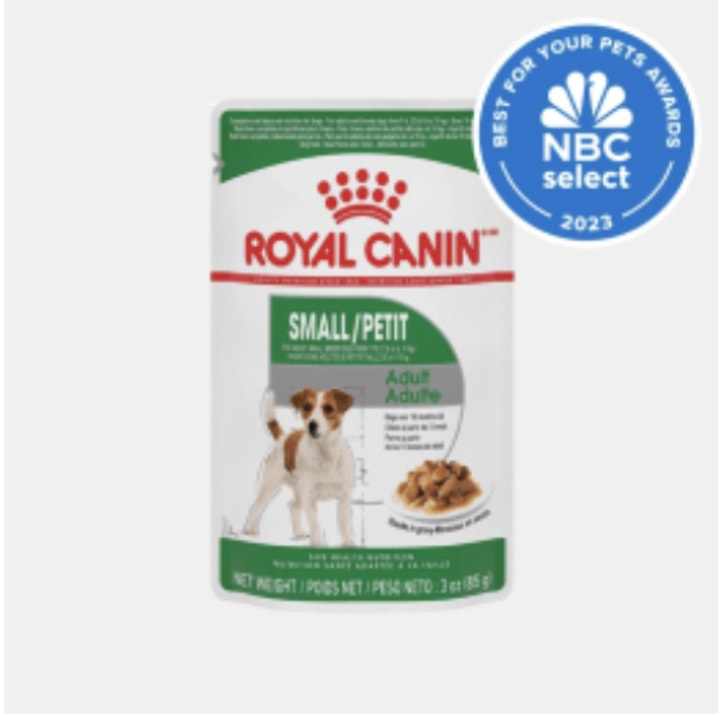
Royal Canin is a favorite among our experts for the brand’s peer-reviewed research, owned facilities and well-regarded reputation among pet parents and veterinarians. Both Select updates editor Mili Godio and manager of editorial operations Shari Uyehara are fans of Royal Canin, too. Uyehara says her pup Loki, a 1-year-old cavalier King Charles spaniel, has been eating this dry food since he was just a few months old after her breeder recommended it. Royal Canin increases palatability by sourcing ingredients that dogs crave, like chicken and chicken fat, according to the brand.
Best dry dog food for weight management: Purina
Purina one + plus.
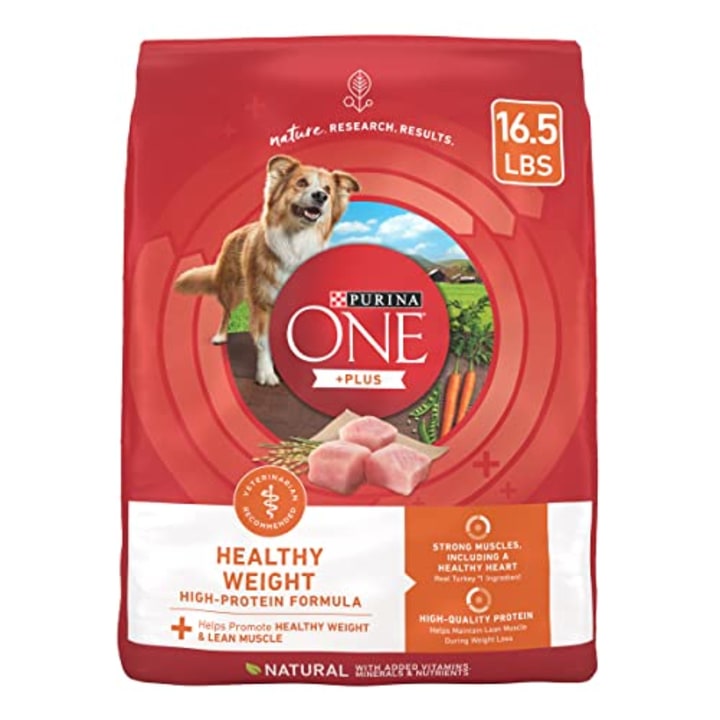
Purina ONE + Plus Adult Dry Dog Food
The feeding instructions on the back of the kibble bag are merely a guide — your veterinarian is the best resource for determining the appropriate number of calories your dog should eat, says Laflamme. Between veterinarian visits, you should monitor your dog’s body condition using the nine-point scale based on observation and physical touch, she says. You can do this by standing above your dog, putting your thumbs over the backbone and fingers over the ribs. Gently move your hands from front to back. If you can easily count and feel your dog’s ribs, they are likely a healthy weight.
If you and your veterinarian determine your dog is overweight, your veterinarian may suggest a reduction in calories or a weight management diet, such as this Purina ONE Weight Control formula. It’s the recipe Laflamme feeds her own dogs and is part of Purina’s budget line. However, if pet owners want to add probiotics and more natural ingredients to their dog’s diet, a slightly pricier alternative is available from Purina, Purina Pro Plan Weight Management . While it may cost a bit more, Select’s associate updates editor Zoe Malin says her 100-pound yellow lab, Chance, is both healthy and happy eating this formula.
Best budget-friendly dry dog food: IAMS
Iams adult minichunks.
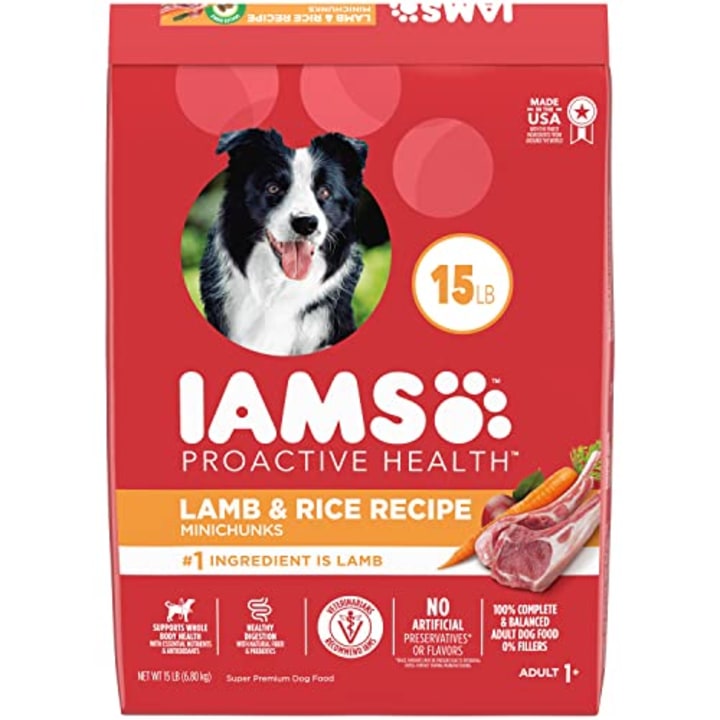
IAMS Adult Minichunks Dry Dog Food
When it comes to kibble, there is often a wide range of options available to pet parents at varying price points. For those on a budget, certain dry dog foods may include byproducts that help keep the cost down. “Byproducts are ingredients that are not typically used for human consumption,” says Stockman. It’s not because the ingredients aren’t nutritious, but it might include meat that isn’t visually appealing or internal organs that aren’t culturally accepted as a food source. Byproducts are a great source of vitamins and minerals for dogs, and from a sustainability standpoint, using byproducts also helps to reduce food waste, says Stockman.
IAMS’ recipe offerings are diverse, and IAMS Adult Minichunks is a standout choice due to its high-quality protein sources, such as lamb, chicken and whole-grain barley. The recipe also contains a blend of fibers and prebiotics to promote a healthy digestive system, according to the brand.
Best dry dog food for large-breed puppies: Wellness
Wellness complete large breed puppy.
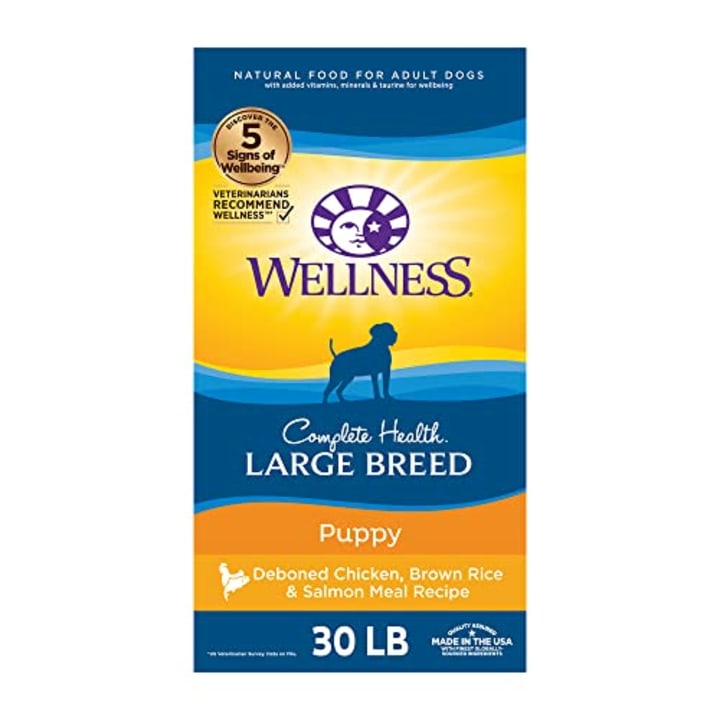
When allowed to overeat, large-breed puppies tend to grow too quickly, and their bones might not be able to keep up, says Laflamme. This puts them at risk of developing orthopedic or skeletal issues. “One of the best ways to prevent this is by keeping your puppy lean, limiting the amount of food they’re allowed to have and feeding them a diet specifically formulated for growing large breed puppies,” she says.
Large-breed formulas that meet AAFCO’s nutritional adequacy recommendations have all the protein and minerals your puppy needs, but with fewer calories. This Wellness formula has just 367 calories per cup, which includes protein from deboned chicken and chicken meal, as well as energy-rich carbohydrates like brown rice and oats, according to the brand. The formula also has glucosamine, which helps maintain joint health and is particularly beneficial for large-breed dogs, according to Wellness.
Best dry dog food for adult large breeds: Merrick
Merrick healthy grains large breed.
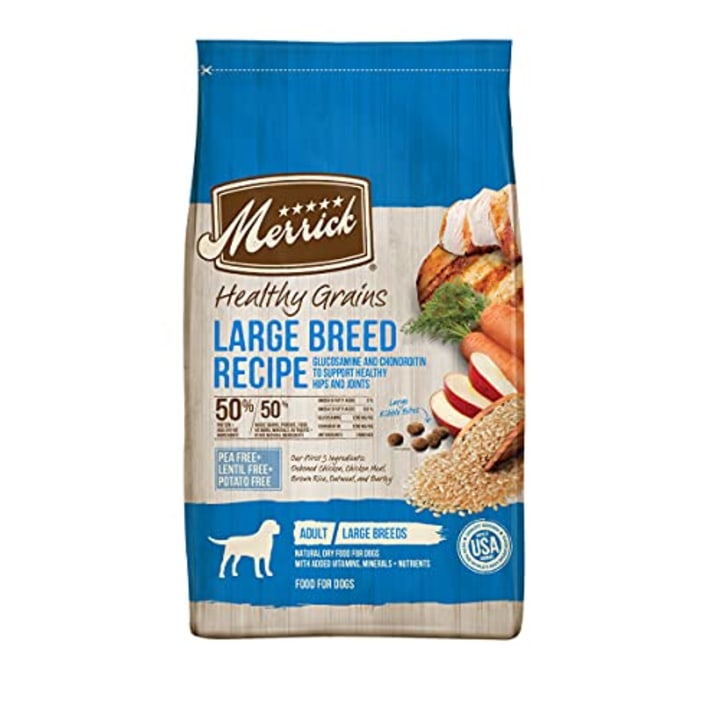
Most large-breed dogs are no longer considered puppies when they reach about two years of age. However, this can vary depending on the individual dog and when they stop growing. During this period, Laflamme recommends two options for transitioning your dog to a formula suitable for adult dogs: either switch to an all life stages food that provides nutrients for both puppies and adults, or consider an adult formula that’s not suitable for a growing puppy.
This adult formula from Merrick is made in small batches in Merrick’s Hereford, Texas kitchen. It’s packed with omega-6 and omega-3 fatty acids, which means it’s specially formulated with glucosamine and chondroitin to support healthy hips and joints, according to the brand. It also contains L-Carnitine, a supplement that helps to keep your gentle giant lean, according to Merrick.
Best dry dog food for small-breed puppies: Hill's
Hill’s science diet puppy.

Puppies require more calories per pound of body weight than adult dogs to fuel their growth and active lifestyles. AAFCO recommends that puppy food include 22% protein and 8% fat, and other important vitamins and nutrients for growth.
According to both Laflamme and Kaufman, Hill’s is a trustworthy brand that delivers quality pet food to pet parents and their pups, and Hill’s Science Diet’s dry dog food for puppies is no exception. It’s packed with the nutrients your puppy needs for a healthy start to life, like calcium and phosphorus to help build strong bones and teeth, and the omega fatty acid docosahexaenoic acid (DHA) to support healthy brain and eye development. The formula contains antioxidants and vitamins E and C to support your puppy’s developing immune system, according to the brand.
Best dry dog food for sensitive stomachs: Instinct
Instinct original grain-free recipe with real rabbit.
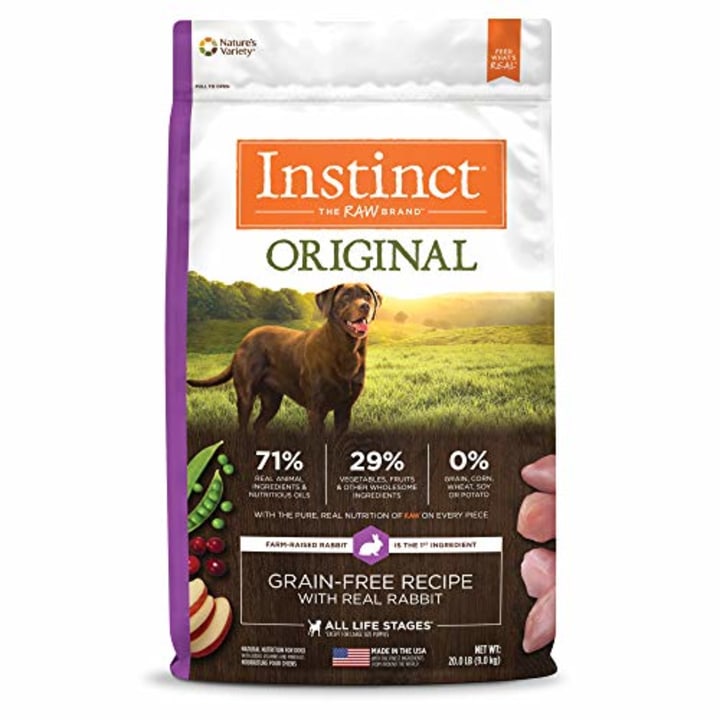
Many pet food diets are touted as grain-free, meaning they don’t contain common carbohydrate grains, like wheat, rice and barley. But unless your pup has a gluten intolerance, grain-free diets aren’t known to provide additional benefits when compared to other complete and balanced foods, according to our experts. Unlike their gray wolf ancestors, there’s evidence that domestic dogs are perfectly able to digest carbohydrates, says Dr. Jonathan Stockman , assistant professor of clinical veterinary sciences at Long Island University College of Veterinary Medicine.
A novel protein or limited-ingredient diet may relieve your dog’s symptoms if they have a food intolerance or a true food allergy. This option from Instinct uses rabbit as its protein source and leaves out any ingredients that include corn, wheat and soy, according to the brand. Additionally, probiotics and omega-3 and -6 fatty acids soothe the digestive tract, skin and any lingering inflammation.
How to shop for the best dry dog food
There’s a lot to consider when buying the best food for your dog, and most come down to you and your dog’s personal preferences, as well as your dog’s life stage and breed size, experts told us.
- Ensure your dog’s food meets AAFCO standards. AAFCO is a non-profit group that establishes nutritional guidelines for pet food based on life stages. Although AAFCO doesn’t approve or regulate pet food formulas, pet food companies that include an AAFCO nutritional adequacy statement conduct thorough testing to ensure their food meets AAFCO nutritional standards for safety and quality.
- Consider your dog’s life stage. Dry dog food is typically labeled as growth, which is specifically formulated for growing puppies or all life stages, which means it meets the minimum AAFCO nutritional requirements for both puppies and adult dogs. Food for puppies must include a minimum of 22% protein and 8% fat, in addition to other important vitamins and nutrients, like DHA, calcium and phosphorus, according to our experts. Adult dogs, on the other hand, require food formulated for maintenance, or they can eat food labeled as all life stages. Maintenance dry food must include a minimum of 18% protein and 5% fat.
- Make sure it’s made for your dog’s breed size. Our experts suggested feeding according to breed size to meet the unique growth patterns and health needs of small- and large-breed puppies and adult dogs.
- Ensure the brand consults veterinary nutritionists. A recipe developed with the guidance of a board-certified veterinary nutritionist ensures the recipe has been formulated with the necessary nutrients for your dog’s age and breed size.
- Keep in mind, price doesn’t always equal quality. You should consider a range of quality options across various price points that meet AAFCO standards and are suitable for your dog’s breed, size and life stage.
Frequently asked questions
The best dry dog food is the one that is palatable to your dog and meets AAFCO's nutritional guidelines for their life stage, according to our experts. It should also be affordable and approved by your veterinarian based on your dog's nutritional needs. Meat doesn’t need to be the primary ingredient in food, as dogs are omnivorous and can get the necessary amino acids from plant-based sources, says Laflamme. Unless your dog has an allergy or intolerance, grain-free dry food isn’t necessary, veterinarians told us.
Both complete and balanced wet and dry dog food formulas can be nutritious choices for your dog, each with its own advantages and disadvantages. Dry food is a convenient and cost-effective option for pets, and certain dental diets approved by the Veterinary Oral Health Council can also promote oral health. This higher moisture content in wet food can help keep dogs hydrated, especially if they don't drink enough water on their own , says Savageau . You should also consult with your veterinarian if your dog has any conditions such as renal disease that can benefit from a moisture-rich diet.
If labeled with the AAFCO statement for puppies (growth) or all life stages, dry dog food is a healthy option for your puppy. The AAFCO statement means that the recipe meets or exceeds the association’s recommended nutritional requirements for growth, which include an appropriate balance of protein (minimum 22%), fat (minimum 8%) and vital vitamins and minerals, such as DHA and calcium. It's crucial to choose a recipe based on your dog's breed, as large- and small-breed puppies have distinct growth patterns and, as a result, differing calorie needs, according to Laflamme.
“The best way to store dry dog food is in an airtight container that is kept in a cool dry space,” says Kaufman. “All dog food bags should be placed in this container and properly sealed once opened.” Make sure you wash this container regularly. A good rule of thumb is to wash it every time you finish a bag of food.
Meet our experts
At NBC Select, we work with experts who have specialized knowledge and authority based on relevant training and/or experience. We also take steps to ensure all expert advice and recommendations are made independently and without undisclosed financial conflicts of interest.
- Dr. Dottie Laflamme is a veterinarian and an independent consultant of animal nutrition. She formerly worked for Purina’s Research and Development team until her retirement in 2015.
- Dr. Jonathan Stockman is a veterinarian and an assistant professor of clinical veterinary sciences at Long Island University College of Veterinary Medicine. He is also a veterinary consultant for Petco but does not receive financial compensation to recommend any brands.
- Dr. Nicole Savageau is a veterinarian with The Vets in Austin, Texas.
- Dr. Anna Kaufman is a veterinarian at Bond Vet , which has locations across the United States.
Why trust NBC Select?
Janelle Leeson is a Portland-based freelance writer who holds a bachelor of science degree in biology. Her approach to pet-care writing and reporting is rooted in scientific principles that consider a pet’s biological need for play, proper nutrition and environmental enrichment.For this piece, Janelle interviewed two experts who specialize in veterinary nutrition. She also researched dozens of dry dog foods on the market that met criteria based on our experts’ insights. She included dry dog foods recommended by experts, along with those that are highly rated and meet expert shopping guidance.
Bethany Heitman is a contributor at NBC Select and a journalist who regularly covers topics like beauty, home and lifestyle
Catch up on Select’s in-depth coverage of personal finance , tech and tools , wellness and more, and follow us on Facebook , Instagram , Twitter and TikTok to stay up to date.
Janelle Leeson is a Portland, Oregon-based freelance writer who covers everything pets and a few subjects in between, including sustainability and clean beauty. In addition to Select for NBC News, her work appears on Shop Today, USA Today Reviewed, INSIDER Reviews, Daily Paws, Rover, Great Pet Care, and other online publications. Her work has also appeared in print in Inside Your Dog's Mind, Inside Your Cat's Mind, and Paw Print magazines.

IMAGES
VIDEO
COMMENTS
During your puppy's first visit, the vet should: Weigh the puppy. Listen to heart and lungs with a stethoscope. Take their temperature (note: pet temperatures are taken rectally) Examine eyes ...
Veterinary staff will start the visit by asking you a series of questions about your puppy's history and how they are doing at home, followed by: A weight check. Measuring body temperature and pulse and respiratory rates. A complete physical examination, which includes. Observing the puppy move around the exam room.
The first vet visit for your puppy is crucial for their overall health and well-being, including vaccinations, preventive treatments, and a comprehensive physical examination. Establishing a positive bond with the veterinarian during the first visit helps reduce stress for future visits and builds trust.
Payment. Your puppy's first vet visit is likely to last one hour or more and cost between $100 and $200, though costs can vary depending on geographic location, selected vaccines, suggested medications, and other treatments. Each vaccine booster visit is likely to cost $75 to $150. Heartworm prevention as well as flea and tick control will be ...
The first three are generally included in one injection that is given at 6 to 8, 12, and 16 weeks. Some puppies will receive an additional booster vaccination at 20 weeks of age. The rabies vaccine is given at 12 to 16 weeks of age. "The core vaccination schedule will protect your puppy from common diseases, including distemper, hepatitis ...
1. Physical Exam. Once you and your puppy arrive at the vet clinic, you'll check in with the front desk and wait for your veterinarian to see you. All puppies will go through a standard physical exam. They'll get weighed, and the veterinarian will check out their whole body, including listening to the heart and lungs.
The first vet appointment ranges from 30 to 60 minutes. This time allows the vet to conduct a thorough examination, discuss your dog's medical history, and address any questions or concerns you may have. It's a comprehensive session aimed at understanding your dog's health and setting the groundwork for future care.
Before the actual veterinary visit, take your dog for a walk to expend a little excess energy. Gather a stool sample in a plastic bag if he has a bowel movement on your walk. After checking in with the receptionist, sit in a quiet area of the waiting room (if there is one) and speak to your dog in a calm reassuring voice.
Your puppy's first consultation starts with a thorough exam around 6-8 weeks old. Your vet will thoroughly assess their skin, fur, eyes, ears, nose, mouth, teeth, feet, and genitalia. They will also weigh your puppy and check their heart rate. Finally, they will check for intestinal parasites and conduct a fecal exam.
A little prep goes a long way for a new-puppy vet visit. First, find out what the breeder or shelter has already done for your puppy. You should have documentation listing if your puppy has received: Vaccinations. Deworming medication. Heartworm preventative. Tail docking and/or dewclaw removal, depending on breed.
Distraction: Offer treats or engage your dog in simple commands to distract them from the unfamiliar surroundings. Your new puppy or rescue dog's first veterinary visit is a vital step in establishing a foundation of good health and well-being. With proper preparation, choosing the right veterinarian, and employing stress-reduction techniques ...
Scheduling Your Puppy's First Vet Visit. Puppies are bundles of joy, energy, excitement, and, let's face it, mischief. As soon as you welcome a new furball into your home, the flurry of puppy ...
Here are 9 questions to ask pertaining to care, vaccination, diet, pet insurance, and socialization. Raising a puppy is most definitely _not_a one-person job. Novice and veteran pet owners alike rely on a team of supporters to help keep their dogs happy and healthy from puppyhood into their senior years. Your vet is your most vital pet care ...
During your puppy's first visit, a veterinarian should do the following: weigh the puppy. listen to the heart and lungs. take puppy's temperature. examine the puppy's eyes, ears, nose, feet, and genitalia. examine the puppy's skin and coat. look at the puppy's teeth and mouth. palpate abdomen and lymph nodes. examine the feces for the presence ...
Schedule a first vet visit for your new puppy within a few days of bringing them home. The vet will review their records, perform a physical exam, and check for health concerns. Puppies typically have appointments every 3-4 weeks starting at 6-8 weeks old, and ending at 4-5 months old. First vaccinations usually begin at 6-8 weeks old.
Stay calm during your puppy's first vet visit. If you get nervous or show any signs of anxiety, your dog may also become anxious. One of the reasons dogs, especially pups, get uncomfortable when visiting a vet is because they sense their owner's emotions. So, if you get nervous or show any signs of anxiety, your dog may also become anxious.
2. Preparing for your dog's first vet visit. Dog travel crates or carriers provide a safe, enclosed space for your pup to travel in comfort. Look for travel crates with special openings for car safety belts; an important feature allowing the crate to be securely fastened to your car seat.
A puppy's first vet visit is typically extensive and comprehensive, making it more expensive than subsequent visits. The cost of a puppy's first exam generally ranges from $40 to $65. Then you'll need to add the cost of vaccines, diagnostic testing, and any other medications needed. The initial set of vaccines can cost between $200 and ...
A puppy's first checkup at the vet can be overwhelming for pup parents. Proper preparation is crucial. At the vet, the pup will undergo a thorough examination, including a weight check ...
Schedule a Vet Visit As Soon As Possible Call your veterinarian within the first 48 hours after getting your new puppy to arrange an appointment. They will be able to check your puppy for symptoms ...
Vaccines. Your pet will undergo their first round of vaccinations and preventative medications for fleas, ticks, and heartworm during the visit. Pets are due for these every 3-4 weeks until they're between 4 and 6 months old. There are core vaccines and non-core vaccines. Core vaccines are recommended for all dogs and cats.
VCA Vets & Pets Animal Hospital provides primary veterinary care for your pets. VCA is where your pet's health is our top priority and excellent service is our goal. ... Your Visit Your Visit Your Visit; New Clients; Client Forms ... FREE First Exam Get your coupon Refill Pet Rx Prescriptions, food and more myVCA makes it easier for you to stay ...
Specialties: Silicon Valley Pet Clinic & Urgent Care is a full-service animal hospital and welcomes both emergency treatment cases as well as pet patients in need of routine medical, surgical, and dental care. We have years of experience treating serious conditions and offering regular pet wellness care. Beyond first-rate pet care, we make our clinic comfortable, kid-friendly, and calm, so ...
Welcome to Silicon Valley Pet Clinic & Urgent Care Your Veterinarian in Santa Clara,CA Call us at (408)248-3844. Pet Emergency? Call us right away at (408)248-3844!. If you live in Santa Clara or the surrounding area and need a trusted veterinarian to care for your pets - look no further.
During your puppy's first year, their vet visits will mostly consist of immunization as well as heartworm, flea and tick prevention. Puppies are required to get rabies vaccines in most states.
If you want to travel with your pet to another State or country, you'll need to meet these requirements whether you're traveling by plane, car, train, or boat.
The best dry dog food to keep your pet satisfied and healthy. Shop Hill's, Iams, Purina, Royal Canin and more at retailers like Chewy, Petco and Amazon.
Our Veterinary Services. We provide veterinary services for every stage in your pet's life, from her first shots to a lifetime of preventive care, to keep her happy and healthy. Our services don't end at our hospital doors. As a member of the VCA family, our veterinarians have access to extensive medical resources, not the least of which is the ...
Dog and cats traveling to the Ivory Coast (Cote d'Ivoire), must have an import permit issued by the Directorate of Veterinary Services of Cote d'Ivoire. Import permits are only issued AFTER there is an APHIS-endorsed health certificate. Certificates must be issued by USDA accredited veterinarians and endorsed by APHIS within 10 days of travel.